#I think they work very interestingly as a villain couple
Text
After rewatching Into the Spiderverse last week, and my third viewing of Across the Spiderverse this weekend, a bit of a crack theory has been percolating in my head. Some spoilers here, so putting this under a readmore:
I think Doc Ock has a chance of returning in Beyond The Spiderverse. A slim chance, but a chance nonetheless.
Point A: Lack Of Resolution
This is pretty obvious so I won't belabor it; despite her role as a pretty significant villain in ItSV, along with Kingpin and Prowler, the mind behind the supercollider and given a pretty fantastic reveal, she also winds up getting hit by a truck during the climax and not being heard from again. The Prowler died, Kingpin got defeated and webbed up for the police, even Tombstone was seen getting arrested and shoved in a cop car, and the other henchmen like Scorpion also got pretty conclusive defeats at the hands of the 2D spideys during the fight itself.
But with Liv, there's no real confirmation of what happened afterwards; whether she got arrested, or ran off, or the impact was fatal and her body recovered, or what; no clue. (And if she did end up shoved through the Collider and landed in another dimension, she'd be subject to the same glitching, cell decay, and eventual death as the others, without the Spider-society tech to stabilize herself.) And like, that doesn't necessarily mean anything on its own, but at the very least the principle of "didn't see the body" is in play.
(Interestingly, I remember hearing somewhere that there was a deleted scene of her intentionally jumping into the collider portal while saying the "power of the [X] in the palm of my hands!" line that later went to Spot. Though idk where I heard it, so am unsure if this is actually legit. And even if it is, it was still a scene they chose to remove from the final film, so while it could mean that intent is still there, they also could have changed their minds on the idea entirely.)
On its own, I'd be willing to accept that that's probably the last we've seen of her... but as of AtSV, it actually isn't.
Point B: Aaron Haunts The Narrative
This part has no direct connection to her, but bear with me here. If you've seen it, (I hope you have) you know that AtSV ends with the reveal that Miles wasn't sent to his home timeline/universe, but a darker parallel version where his dad is dead but Uncle Aaron is not, and is working with the parallel version of Miles as the Prowler. He does say "I'm not" when our Miles refers to him that way, but the impression I got is that he's halfway-retired from the role but still acting as support for Miles G; the "guy in the chair" if you will.
I digress. Point is, it ends with a return for both Uncle Aaron and the Prowler identity, but this didn't come out of nowhere; all throughout the movie leading up to this, Aaron and/or the Prowler are brought up or indirectly hinted at on an honestly pretty frequent basis. Gwen's drumming recap at the beginning, the memorial grafitti on the rooftop, the Donald Glover cameo, the flash of him on the side of the building during Miles' breakdown sequence as he's rushing to get home, plus a few smaller mentions here and there. ("He takes after his uncle!" during the meeting with the guidance councilor, and a visual comparison with Uncle Ben during the "canon events" presentation, and I feel like there may be a couple others yet that I'm forgetting as well.)
The movie goes out of its way to remind you of him and his importance to Miles at every turn, and part of that is just inherently because he is so important to Miles. But it also feels like, from a writer-to-audience perspective, part of the purpose is also as a reminder; if anyone either saw ItSV but forgot most of it in the intervening time, or simply missed it altogether and for some reason decided to see AtSV first anyway, this makes sure they know exactly who and what he is, so the reveal at the end carries the full emotional weight it needs to. No matter what, you will have the proper context to appreciate Miles' reaction when Aaron steps through that door.
(Also, I just wanna say that I love that reaction in of itself; the hyperventilating panic at first, only to rush in for a tight hug. The mix of terror and comfort that comes with full awareness of both sides of him, and all the associated memories both good and bad, combined with this unexpected chance to see him (or at least a version of him) again. It's just a really great moment on that front.)
But anyway, I'm getting off track again, too many Prowler feels. ^^; What does this have to do with Doc Ock?
Point C: Aaron Isn't Alone In Haunting
This is admittedly both the key part of my theory and also the weakest one overall, so I will readily admit upfront that I may be reading too much into things, and Liv really did bow out for good in ItSV. That being said, here's my thought:
Even if a much lesser extent than Aaron, I couldn't help but notice a similar-seeming trend of brief reminders of her. On one hand, most of these can be fairly easily dismissed as simply maintaining continuity and connection with the first movie, as the bulk of them were in relation to The Spot's backstory as Jonathan Ohm; she was there for the flashback to the misplaced 42 Spider, and then seen again in a framed photo of him, when Gwen was inspecting the remains of his makeshift apartment lab. So while it's a neat inclusion, it doesn't necessarily mean anything more, right? Kingpin got mentioned too, during the Guggenheim fight with Vulture, but I'm pretty sure he isn't going to be making a comeback.
But there is one other instance that feels a bit more significant and out of place, and is what led to this theory in the first place. I mentioned this scene already in relation to the Uncle Aaron foreshadowing/reminders, but going back to it now, there is what I've dubbed the Falling Apart sequence. (From the score that plays during it.) Right after Gwen's talk with her father resolves, we cut back to Miles, swinging through the city in a desperate rush to get back home to his parents in time. (Unaware yet that this isn't his city, his home, his parents, because this isn't his universe.)
Tangential Gushing Over That Scene
It's sort of a dark parallel to the Leap Of Faith/What's Up Danger scene from ItSV, with previous bits of dialogue and past moments echoing in his mind again. There, it was all the inspiration pushing him to finally take the leap and truly become Spiderman; whereas here it's reminders of all the stress and uncertainty he's under as he races against time and possibly destiny itself, not to mention being plagued by doubts after Miguel revealed he possibly shouldn't have become Spiderman to begin with.
But what I especially love is the animation of this sequence, which on first watch I thought was stuff actually happening, but reads more on subsequent viewings like hallucinations during what's basically a panic attack. It's both gorgeous and stressful, with trains derailing and rerailing to chase Miles; the space between the skyscrapers growing narrower and more claustrophobic; and stuff like the 42 Spider, the Spot's arms, and Doc Ock's tentacles also appear briefly to hem him in even further until the end. He finally breaks free at the end, with Aaron's dying words to "just keep going" pushing him to make it the rest of the way 'home' unimpeded, a tiny bit of much-needed catharsis amidst all the overwhelming... everything else.
I really love this scene, in case it wasn't obvious.
Point C, Continued: Why Tentacle Happen?
But to get back on track, nearly everything about this sequence is mainly focused on ideas introduced in Across; the Spot, Miguel, Jefferson's predicted demise. The Spider is from the first movie, but still given extra context now; the first big exception is the reuse of Spider-Ham's line about how "the hardest part of this job is that you can't always save everyone" while images of him, Noir, and Peni appear on the glass building Miles is swinging past. Even that is still relevant to the current crisis, and their appearance there is further justified when they too properly show up again in Gwen's 'band' at the very end.
But then there's this:
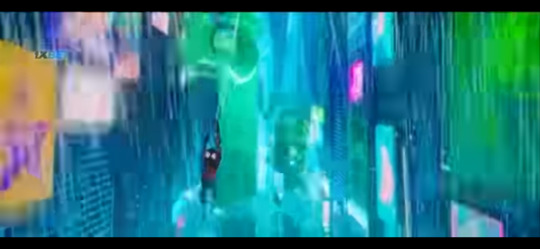




The dialogue at this point is a line from Rio; while the appearance of the tentacles definitely further intensifies the claustrophobic crush of the city, it also feels like much more of a non-sequitor than even the 2D Spideys just a few shots earlier. Liv has had nothing to do with anything going on, (or at most, very indirect involvement like the displacing of the 42 Spider) has no dialogue called back to here; and heck, even in ItSV felt more like a rival to Peter B specifically instead of being especially relevant to Miles, compared to Prowler and Kingpin. So why call back to her here? It could indeed just be that the tentacles are good for adding to that entrapped feeling, but given how well-constructed the rest of the sequence was, and how deliberate animation as a process is in general, this would seem oddly careless to include so casually.
Conclusion
On the whole, I'll still readily admit that this is a pretty flimsy bit of 'evidence' (more just symbolism, really) to base a whole theory off of. Yet still, between that part of the Falling Apart sequence, the parallels to how Aaron and Miles G were foreshadowed, Liv's abrupt disappearance and lack of closure in the first film, and the knowledge that this is the first half of a split script, with all sorts of other setup in Across still awaiting payoff in Beyond, I do kinda at least feel like there may be something here.
(At the same time, the docket is already packed with a shitton of stuff that Beyond needs to be able to address and resolve, plus apparently some additional new stuff mentioned in interviews like another Gwen, Toei Spiderman, and Hobie's universe. So with all that going on, I'm not entirely sure they'd have the room for yet another returning character in amidst literally everything else.)
So while I'm not strictly counting on this to come to pass, at least for now, the basic idea is that Doc Ock got hit by that truck, fell through the collider portal and into another universe, (probably Earth 42, possibly elsewhere we may have yet to visit) and somehow found a way to stabilize her glitching to survive during the intervening time, set to make a dramatic return appearance during Beyond.
As to what role she may play, I'm not sure. I could see her making some sort of temporary truce with one of the main Spider-people for a common goal, without giving up on her evil mad science in the long run. Possibly with Miguel's group against the Spot, in exchange for freedom to keep experimenting with the Multiverse instead of getting sent back home, though I also don't think he would be willing to make that bargain unless things are truly desparate and he's fully lost the support of the rest of the Spider Society. So it could also be with Gwen or Miles, against both the Spot and Miguel; the former's more unpredictable tampering and newly eldritch nature getting in the way of her research, while the latter would of course want to put an end to her experiements and send her back home in his efforts to restore order, giving her reason to ally against.
On the other hand, her remaining entirely villainous and antagonistic would also make a lot of sense, if not moreso. If she landed in Earth 42, she could wind up as the big obstacle of the detour instead of Miles G, allowing the latter a more nuanced and dynamic role. Alternately, I could possibly see her further experimentation being connected in some way to the destruction of the universe Miguel replaced himself in, unknowingly sending him on his canon-hardliner spiral, which would certainly give her a lot more relevance to the current conflict.
But ultimately, all of that depends on whether she really would show up again, which as neat as it would be, definitely does feel like a bit of a long shot at the moment. I guess we'll just have to wait and see.
#not a reblog#spiderverse#across the spiderverse#across the spider verse#across the spiderverse spoilers#beyond the spiderverse#beyond the spider verse#doc ock#olivia octavius#getting sidetracked by gushing over animation#theory#crack theory#spiderverse theory
49 notes
·
View notes
Text
Blue Beetle is a triumph for DC, the Latinx Community, and Superhero Movies - SPOILER FREE REVIEW
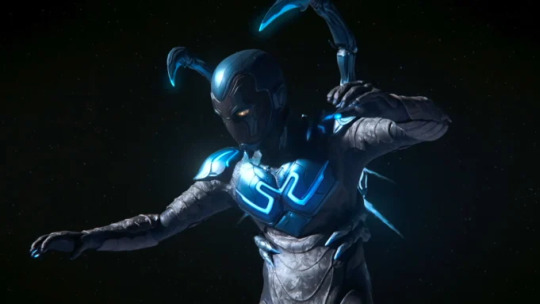
Ángel Manuel Sotos new DC film Blue Beetle is hitting theaters this week but has had a significantly hard road to get here.
The film was originally sold as a direct to streaming film, then was moved to theatrical release, was caught in the middle of a James Gunn take over, and now a writer's/actor's strike. Couple all that with superhero fatigue, and DC's not so clean track record, the film would have to jump massive hurdles to be successful most movies do not.
Blue Beetle, however, is a magnificent departure from superhero films of late that coast on past projects, name dropping, or cameos. It is a delightful film that centers on family, responsibility, and the many different types of Latinx experiences, all while being extremely funny and full of incredible action.
Director Manuel Soto breathes new life into the DCU in a way few directors have before. instead of opting for uniformity with other superhero projects, the film has a distinct color and design that feels unique and fresh. Excellent design, costuming, and vibrancy make up a beautiful Palmera City.

One of the most notable aspects of the film was the fluid, dynamic fight choreography for Blue Beetle and our main physical antagonist, Carapax. While there are several heroes who have similar powers to Jaime, none quite have used it as interestingly. The shifting of weaponry, flight, and hand to hand combat make for types of fights we don't really see in live action.
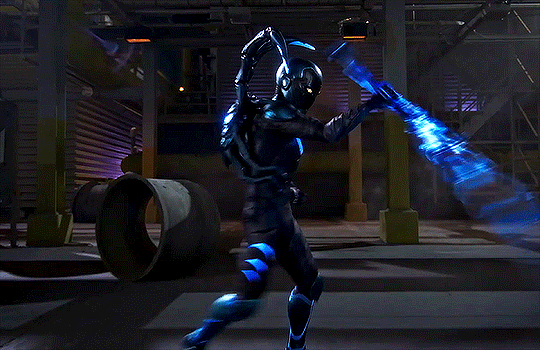
This film of course is not just made up of excellent visuals, but a phenomenal supporting cast. It is hard to pick out favorites, as most characters are given an opportunity to shine.
Through this cast, Manuel Soto shows the many realistic day to day fears and feelings of a Latinx/Hispanic person. Responsibility, family, and becoming who you are supposed to be are all at the heart of the film. As a Latinx man, so many aspects of the film hit home for me, sometimes comedically, sometimes tragically.
The movie also emphasizes different kinds of experiences in our community. Undocumented citizens, first generation, the religious traditional older member of the family, even the slacker uncle. Every member of the family feels different, but they all feel like a family.
For me, I'd say Belissa Escobedo as Milagro Reyes brings excellent sisterly back and forth with our hero and has some very emotional moments in the film. Brother/sister chemistry is sometimes difficult to pull off, but Escobedo makes it look easy. I think she has the making of a comedic star on the rise and is someone to lookout for.
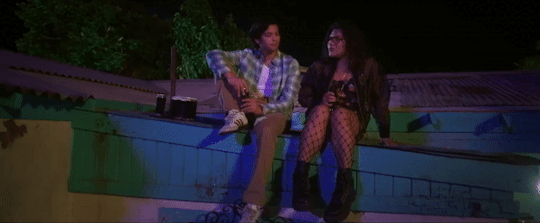
I'd say most members of the family will be someones favorite. George Lopez as Rudy, Jaimes Uncle Rudy, Damián Alcázar as Alberto Reyes, Jaimes Father, and Adriana Barraza as Nana, the matriarchal head of the family all got big laughs and, at times, tears from their performances.
This cast is phenomenal and elevates excellent writing into several iconic scenes. I don't see this film working without the perfect familial blend of actors. And they got it perfectly.
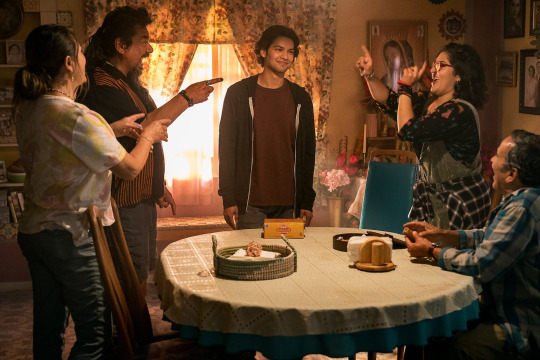
While characters like Elpidia Carrillo as Rocio Reyes or Bruna Marquezine as Jenny Kord do get the short end of the stick in the film, I think they get their moments and will be greater utilized in (hopefully) future installments of the franchise.
What made it most clear that Manuel Soto understands character were the two antagonists of the film.
While they are not nearly as significant as the rest of the family, both Susan Sarandon as Victoria Kord and Raoul Max Trujillo as Conrad Carapax are not reduced to twirling mustache villains. They both have realistic and at times tragic stories that explain (but does not justify) their actions.

While both give solid performances and are a step above your average Marvel/DC villains, I think the film could've benefitted from more of them.
But the real highlight of the film, to no ones surprise, was Xolo Maridueña as Jaime Reyes.

Maridueña as Blue Beetle feels like one of those castings that seem impossible to be topped. He brings excellent comedy, pain, and honor to Jaime in a way that feels natural. He is Blue Beetle.
In the film, Maridueña displays a wide range of emotions while he goes through an incredibly grueling 2-3 days. There is comedy, awkwardness, strength, anger, and pain, and Maridueña nails every moment of it.
I expect you will see a lot more Xolo in the future even if we don't see more Blue Beetle. But I hope he does return.
I think this movie has the potential to connect with audiences in a way we just haven't seen in a long time from a Superhero film. It is original, fun, and shows us a side of DCU we've never seen before, without endless cameos and reminders of past projects.
I hope other studios take away that audiences want more representation via original content from creative visionaries. But Hollywood often takes away the wrong lesson.

All in all, Blue Beetle is an incredible film that balances comedy, drama, and action in a way superhero movies rarely do. If you get the chance to, I highly recommend you go out and give it a watch. Films as good as this deserve support.
Blue Beetle is out in theaters this Friday August 18th.
Thank you for reading! If you'd like to support me, you can:
Follow me at www.facebook.com/romancomicsnews
Follow me on Twitter @diegoleonroman
Follow me on Threads @romanleondiego
Help me pay my student loans by donating!
#dc comics#dc universe#angel manuel soto#xolo maridueña#blue beetle#dcu#dceu#blue beetle battalion#blue beetle movie#blue beetle graduation day#george lopez#movie review#film review#spoiler free#Belissa Escobedo#Elpidia Carrillo#Bruna Marquezine#Ángel Manuel Soto#Raoul Max Trujillo#Conrad Carapax#Carapax#Susan Sarandon#Jenny Kord#Victoria kord#uncle rudy#Damián Alcázar#Adriana Barraza#blue beetle 2023
36 notes
·
View notes
Note
I'm really sorry if this will sound confused...I think I saw a post of yours talking how MPA wouldn't mind a quirkless as long said person proves to be strong.
You think MPA hates quirkless or mutants? Bc the idea of them not hating a quirkless person(proving said person is useful) is interesting way more than (they want to to kill everoyne who is quirkless)
Also what was their end goal?
Alright, I know what you're talking about. The ask on my Quirkless post has the anon mention, among other things, the MLA... but ultimately, I thought they were irrelevant to the question at hand, so I didn't mention anything about them in the post.
But, well. It's relevant now!
Alright, so. On MLA and the Quirkless, I think to be through I have to say that, while they don't actually care about the Quirkless now, in the newer incarnation, since they're almost extinct and thus are a non-factor, the original MLA probably cared a whole lot, because they were fighting against them.
In the original conception of them MLA and Destro were fighting for Quirk rights against the government who was trying to control them (this is the point where the draconian and honestly kind of nuts Quirk laws come from), and while it doesn't mention it, considering their general... Quirk supremist, militant nature, and the fact his mom was killed by an anti-Quirkist (which, by implication, means they were all Quirkless, even if the term wasn't a thing at that point), I can't really see them not fighting against the normal people.
Interestingly, despite this being a seemingly obvious point for them do, somehow no one ever... says MLA did this? Which is strange. Or, maybe 'strange'. Hmm. I wonder, why would Hori not want to mention something obvious about a topic he stopped talking about years ago?
*judging look intensifies*
But yeah. That's first generation MLA is defined by the Quirk vs Normal political landscape. The second generation is focused around Quirk rights as well, but more focused on the heroes as the extension of the government and symbol of society. I can't really see them thinking about a Quirkless person, but if it ever came up, there's no way they would let on in. Unlike heroics, where it's a question about abilities, and everyone looking at what heroes do and say, 'But, a Quirkless person could do that!', the MLA are fundamentally extremists. Sure, the higher ranks are probably more practical (and hypocritical, and generally power hungry), and they'd be willing to use a Quirkless person if it was relevant, they'd never let someone so fundamentally opposed to the very foundation of their ideals into their organization. Hell, there's a real question if they'd even let them live.
Mutants... actually, that's an interesting thought.
On the face of it, they have Quirks, so of course they'd be fine with them, right? But, when you look at the main MLA members... oddly enough, you find not one mutant in their ranks. In fact, they're the only villains without one in their leadership somewhere (admittedly, I'm a little hand waggly about Chronostasis as a mutant Quirk, but whatever).
I can see a couple of reasons for this: Option One, Hori was tired, and doesn't want to do the extra work making a mutant character. Harsh, but possible. Also boring.
The second option is that, well, the mutants just... aren't strong enough to make it into higher levels of their organization, or versatile, since it is theoretically built around Quirk strength. I... when I think about it, I can't really point out a 'strong' mutant Quirk. Oh, sure, there's decent ones, but, but when compared to the highest end Quirks we see (ignoring AFO and OFA), they're not comparable to people like Endeavour, or Geten, or even Bakugou, they can't match sheer firepower they can offer up. Nor can I really think of a supportive one like Shinso, La Brava or Trumpet. A mutant Quirk will make you stronger than a Plain Jane human, sure, but if your power is 'I'm big and strong and I can survive a car hitting me without major issue', and my power is, 'Fuck you, I vomit lasers'... as long as I don't fuck it up, the odds are going to be in my favor. Mutant Quirks, in that respect, seem inherently limiting on a sheer power level kind of basis, and MLA is exactly the kind of organization to focus on that in a more realistic way than the heroic rankings do.
The third and final option is... well. They're racist. Or Quirkiest? Mutantist? I'm not actually sure we have a term for people who are opposed to mutants... but yeah. They are a modern organization, built from modern people, and anti-mutant sentiment is (theoretically) a thing that is happening in MHA. Quite simply, their biases could be influencing them to not value mutants to their full extent.
Ultimately, that's me just thinking too much on a minor detail, but hey, that's probably why people keep asking me things.
On their end goal... you know how the Quirk laws in MHA don't make sense, for an average person? Why can't a random person use their minor Quirk to help them do something when it doesn't harm anyone or cause disruption?
It's because those laws are set up to restrict Quirk use and try to force everything to be like it was before Quirks, and were created in those earlier times when Quirks were coming in and society was trying to adjust; the powers that be fought against the Quirked, but the realized it was hopeless to stop it, so they changed their tactics. If the government couldn't stop people from being born with powers, and can't take away the powers, it settled on taking away the right to use those powers. The MLA is opposed to that, considering it a basic human right, but they're the crazy radical end of that spectrum, who has skipped over things like, 'reform the laws' and went straight to 'Let's overthrow the government and make a new one!'
Theoretically, they're going to make a new order built around Quirks, where the strong dominate... basiclly, a place where everyone runs off Bakugou-logic. I say theoretically, because, well, you need a lot of people to run a country, and they need skills beyond having a magma fist. Because, you know, there's a reason why the world isn't run off of Bakugou-logic.
In all honesty, I think it would, in an 'ideal' situation for the MLA, where there are no AFOs or OFAs to stop them, end up being more about putting Re-Destro in charge than anything, since I'm not sure what they have, plan wise, for a Quirk based government beyond, 'Powerful Quirks and Freedom, ???, profit!', and I doubt that long term they'd have any stability. Ultimately, grand ideals aside, they're more focused on the 'bring down the government now!' than anything about what happens after that.
23 notes
·
View notes
Text
Chapter 4 of Harrow the Ninth
Back to second person
So in trying to keep track of what Ianthe's eye color changes over the course of this chapter meant, I went back to the first book to try to see if I could find what color Ianthe and Naberius's eyes were back then, because I pretty much never remember characters' eye colors. I didn't succeed in finding out Naberius's eye color, but I did find this very interesting piece of Ianthe dialog from just after she became a Lyctor:

So it looks like Ianthe had maybe already figured out that the Emperor had absorbed Earth's soul even before this book. I'm sure it's Earth's soul, because I don't think she could have figured that out if she weren't actually on the planet in question

So, ok, it feels like removing a fingernail would hurt a lot, but I used to know someone who removed their fingernails as a nervous habit the way that a lot of people bite their fingernails, and claimed that that never hurt, and also when I was like five or six and was wearing sandals with socks like the unfashionable child I was, I opened a heavy door over my foot and it scraped my entire big toenail off and I didn't feel anything at all. I just looked down at my foot and was like, why is my sock all bloody? It turned out my toenail had somehow become like wet and had scrunched up down to the nailbed. After it dried and became hard again, it eventually just detached and fell off by itself, and again, that didn't hurt at all. Also, my pinky toenails just periodically fall off by themselves, also painlessly. So I think in at least some circumstances of acute nail trauma, the nerves are just all completely obliterated before you get a chance to feel anything, or something like that
Also, more interestingly for this book, it seems that keratin counts as bone when it comes to necromancy, maybe?
This obviously didn't happen right now, but it seems to have happened in this room at some time in the past, based on the end of the chapter. I wonder if this happened before or after Harrow removed Gideon - if it happened before, I wonder if Harrow will have more dreams about things that happened before that will tell us more about what happened during that period of time than Harrow's waking thoughts are capable of
This also means that someone here is trying to kill Harrow, but we do know that already from the prologue when someone also tried to kill her. Ianthe seems like an obvious suspect, but I think she's too obvious for it to be her, sort of like Mayonnaise Uncle was too obvious a villain to be the murderer last book. Also there are three presumably major characters that we haven't even met yet

A very odd mix of compliments and insults. Also, Harrow's eyes are "like flower petals in a darkened room" so I think that means they are still black, or perhaps, back to being black again
This whole thing of pre-Work Harrow (I'm going to use pre-Work and post-Work to refer to things now, since the event that Harrow can't remember is introduced in this chapter as "the work") leaving notes for post-Work Harrow to follow reminds me, first of all, of the movie Memento, and second of all of Harrow leaving notes for Gideon to follow back in Canaan House. I guess this is just how Harrow does things

So there are 24 letters and Ianthe is only giving her 22, which means that the other two, which I guess are letter #1 and the one that Ianthe gets to read if Harrow dies
And this explains why Harrow has a letter that she's supposed to read if she's about to die in the prologue

So, a timeline: she did whatever she did a couple days after the end of the last book

So whatever it was, it wasn't just that Harrow removed Gideon and that saved her soul, and things will be fine unless Harrow reabsorbs her soul again. Something about pre-Work Harrow's plans require Harrow to continue living without knowing anything about Gideon. Is it that Harrow remembering Gideon will automatically cause her to reabsorb her soul? But if it was just that, there wouldn't be a reason why it was very important for Harrow to continue living, unless dying would cause her to remember or something like that

This was written before the Emperor told her that she can't do that anyway, because of the Resurrection Beasts - if he had already told her that and she forgot, he wouldn't have told her again, or would have been surprised and/or angry and frustrated that she didn't remember that, probably. So there is some other reason for this. Possibly just that Aiglamene and Crux would probably talk to her about Gideon or ask what happened to her, and then would be confused when Harrow instead talked about Ortus, or maybe the revised chronology from the last chapter would fall apart when the people who knew her growing up reminded her of how it really was. Actually, I'm surprised that "don't mention your cavalier by name to anyone" isn't one of the guidelines here

So there is something special about the sword, something that pre-Work Harrow knew about, which she didn't know about at the end of the last book, so this must have happened because of the Work. Was Gideon's soul put into the sword somehow, or something like that?
Also, I note that Harrow didn't have this sword with her during the prologue, and she also didn't keep that imminent death letter on her person at that time either, so she was in violation of a couple of these guidelines at that point in time

So the source of thanergy that allows Lyctors to do necromancy in space is called the Lyctoral well. I wonder what/where that is
So pre-Work Harrow placed complete trust in Ianthe to make sure her plan works, whatever it was. I'm sure this will not go wrong in any way at all

I'm guessing this is about the letter that is to be read before she dies? There is a guideline to not die, but several places in this letter mention Harrow's death, so possibly Harrow is supposed to die at a particular point in time, or in a particular way, and a future letter will mention this?

So later, Ianthe says:

So, I'm guessing that pre-Word Harrow did something necromancy-related to Ianthe's mouth that can be undone only if Ianthe replaces her jaw or tongue, and whatever this is is very important for Harrow's plan. Based on the name Harrow gives here, it sounds like it probably restricts Ianthe from saying something (presumably about Gideon), or from saying that to Harrow specifically, maybe? This definitely seems like some kind of spell that the Ninth House would like a lot

Ok, this sort of explains how Ianthe was in the prologue. Also, this like of dialog now makes sense:


So Ianthe does know enough to know about the memory adjustment that happened

In the last book I was wondering how anyone knew Camilla's last name, since it was never mentioned in dialog anywhere. But I guess we're meant to think here that Gideon knew it, so Harrow therefore knew it after she absorbed Gideon, and now Harrow doesn't know it anymore because she removed Gideon
But Harrow did interact with Camilla in Gideon the Ninth. I think it was only one time, but after the Ianthe/Mayonnaise Uncle/Colum fight they had this chat where they compared notes and established that Cytherea probably wasn't Dulcinea while Gideon was on the floor, oblivious, worrying about if she'd ruined Palamedes' thing with Dulcinea. This doesn't seem like something that Harrow should have forgotten, I don't think she has any reason to blank out memories of Camilla, and she definitely remembered everything about Cytherea in the last second-person chapter when she realized that one of the coffins contained her body

Does Harrow have some reason to think that Corona is dead? Gideon didn't have any reason to think that Corona was dead at the end of the last book. From the second paragraph it sounds like maybe Harrow hallucinated something to do with Corona at some point in there, or maybe saw something that Gideon didn't see and is now assuming it was a hallucination because of how Ianthe reacted. Also, the way Ianthe reacts to this at the end of this chapter is pretty weird and suspicious

Here's another piece of evidence for some third-party narrator - this piece of narration recognizes this knife as being Naberius's and specifically says that this is something Harrow never knew about. Gideon would have recognized it, but Harrow doesn't seem to know things that Gideon knew anymore. Is Gideon the third-party narrator? I feel like there is too much knowledge of necromancy and not enough jokes about Dr. Skelebone in the narrative for that to be the case, and also the last time that there seemed to be an opinion in the narrative that wasn't Harrow's, it was about Harrow being bigoted against flesh magicians, and I'm sure Gideon doesn't give a flying fuck about that. I guess the other two relevant people who would recognize Naberius's weapons are Ianthe and Corona, and maybe also some of the other cavaliers from Canaan House, but I doubt the other cavaliers would have something to do with this, and also all of them are dead except for Camilla, who was never in a position to fight Naberius to my knowledge


So, I gather than Lyctor healing is supposed to be automatic and effortless and whatever Harrow has done has caused that to not work anymore, and she has to consciously use necromancy to heal, which she was also presumably able to do before
14 notes
·
View notes
Text
anyways i have been delightfully chewing on tdr 7 for the past couple of days and the thing is i can absolutely see the intent to establish tim-bernard as this romantic couple who are well suited for each other. like, this is clearly a ship meghan is super invested in as tim's canon romance and she clearly has a love for it and for the character of bernard she is creating. i can see the clear intent of "see this is why they adore each other". and i genuinely think that since dc is trying to play it safe with tim's & jon's romances (and pushing bernard as tim's boyfriend in other media as well) i can't picture them doing anything that would indicate that this is anything but a wholesome romance.
however, this means that, interestingly to me, meghan has unintentionally created what i personally find to be a fairly unhealthy, potentially toxic dynamic between the two of them. and i can see exactly how that happened too!! like there are two main factors here to me: 1) meghan's tendency to enjoy and write very fandom-y tropes and 2) meghan's tendency to metatextually comment on her critics.
from the first perspective, we have bernard as she has created him: he's so in love with tim because tim is his savior, tim is saving him from his terrible life, tim saves him from the villain. tim is special! he has figured out tim, but because he is the perfect one for tim, he will wait patiently for tim to open up to him and just be understanding until tim is ready. and this isn't bad on its own! these are all common fiction tropes, especially in action-romance (and comic books in general) when you're trying to justify why your characters work together as a couple. there has to be something that links them together, after all. the damsel in distress/man who saved them trope is a tale as old as time. so, too, is casting the love interest as the person who understands your main character better than anyone else in the world, that's, after all, what sets them apart from all the others. (it's also very common as a fanfic trope--especially in the fandom of old, when ship manifestos were a thing and a lot of the basis of some fanfics were this idea of "well, this is why my non-canon ship/why this person is way better for <character> than anyone else"). but then we mix those tropes with this idea of "bernard has a sad life with no other support", it ends up really casting bernard as very codependent and potentially desperate in his reliance on tim. and then when she pairs that with the story she is crafting for tim: that of someone who is just starting to discover himself, who is very unsure of his place in life, who is actively in the honeymoon phase of his relationship where everything bernard does is perfect to him, it creates this very potentially uneven dynamic: tim is new to all of this and unsure of everything (he didn't even know if they were dating-dating for 6 months! he is living in this ambiguous place where he doesn't necessarily know the rules and everything is muddy) and the person who he is looking to for guidance in all of this (bernard, who is much more confident with this relationship and is the one who initiated it) is someone who is in turn desperately reliant on tim continuing to love him because he needs tim as his savior. so unintentionally, she's created a potentially unhealthy dynamic for this couple off the bat.
and then to touch on the second perspective, which is her tendency to metatextually comment on her critics--such as she did with all of yj:dc. in this case it's the (slighty cringey) dialogue towards the end where bernard is like "i always knew you weren't straight" (paraphrased). like this is clearly meghan herself commenting on her homophobic critics who are very upset that tim is now bisexual while also acknowledging that there were definitely reasons why tim was, for the many years before he officially came out, seen as not entirely straight by fandom. bernard then is speaking for fandom when he basically says "even though dixon and willingham definitely never intended this, the subtext was there and it was valid." however!! from a purely in-text standpoint i cannot stress how dialogue like this makes the hair on the back my neck rise. like. i don't even let my husband say shit that implies he knows me better (or has always known me better) than i know myself. that is a red flag in a partner. in my dating days, i used to get assholes try shit like that ("i could tell you were <insert whatever here>") and it was an immediate non-starter for me. stuff like that should be on a list of traits in a partner to avoid at all costs tbh. paired with this idea that bernard has figured out all of tim's deepest, darkest secrets that tim has not told him (even though tim definitely knows he knows) is kind of...hrm, uncomfortable (?) to me. idk this might just be a personal squick for me in a relationship, but just the whole "i know someone better than they know themselves" is just...nagl, imo, especially when bernard is the one who has been the more confident and proactive one of the relationship from the get-go, because now tim is written as trying to figure himself out and bernard is being written as the person who knows tim so deeply, he knows everything that tim needs from him and who he needs to be for tim and that's the person who is showing tim who is really is. just...not an ideal dynamic imo. that's usually not a hallmark of a super healthy relationship.
+ tied with the possessiveness of immediately giving a necklace with a letter of his first name (again, metatextual to assure critics that bernard is here to stay and is tim's love interest now) so that he can always be with tim as tim's lucky charm. idk there's just a lot that raises several red flags to me.
especially when paired with point one--where bernard has unintentionally been given traits that very well could be seen as bernard having a very vested interest in ensuring that tim stays somewhat dependent on him because bernard is so dependent on tim being with him. bernard wanting to always be with tim has a bit of a darker edge when paired with bernard needing tim as his lifeline from his terrible life. and tim, who is figuring himself out and still in the honeymoon stage would not necessarily see these things as the potential red flags they are (though also, not to pin this all on bernard: tim having a tendency to be self-sacrificing for his loved ones would definitely enmesh himself in this dynamic and feel personally responsible for making sure that he is bernard's savior and would absolutely feed into these toxic dynamics)
and i can tell!! very much!! that this is not how meghan is not intending this relationship to be read. like this is way more insidious than i'm sure meghan is intending. like, i know i am objectively wrong here and i genuinely don't think bernard is this insidious or bad. like, obviously, it's meant to be more wholesome and innocent than all of this. there's no sinister framing, there's clear out of text, sensible explanations for why she would write their romance this way. the intent is clearly for cutesy romance!
however, to me, it's almost like she's accidentally created a potentially super toxic pairing that has all the groundwork to go very, very wrong and i am 100% more intrigued by this reading. it makes me go "run, tim, run." i want to see the ramifications of this relationship and i am in full support of them breaking up because this is so potentially unhealthy. which. i don't think she was planning at all when she was so excited to give us bernard's pov. lmao. oops.
#anyways i am aware that i am wrong i am just amused at how she's managed to unintentionally make me go yikes#when i know that's 100% not her intention it's just when you put it all together i'm definitely a little yikes
26 notes
·
View notes
Text
Spider-Man Read-Through 030: vs. Nightcrawler (ASM 160-162)
MASTERPOST
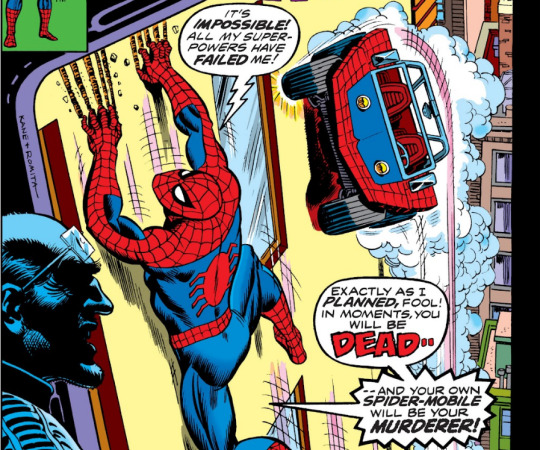
I mean, with that cover, this can only be a win, right?
Spidey is getting tired of running into these goons in goofy costumes, which I completely agree. Then his Spider-Mobile tries to kill him. He escapes and gets on a police car, then...
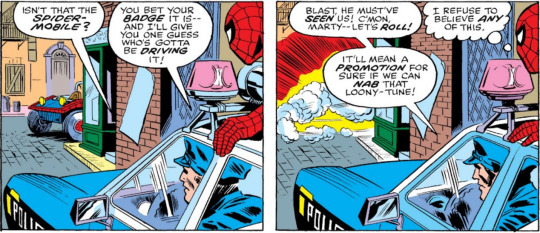
Spidey's last thought bubble really makes the scene, hahaha. The Spider-Mobile disappears though...
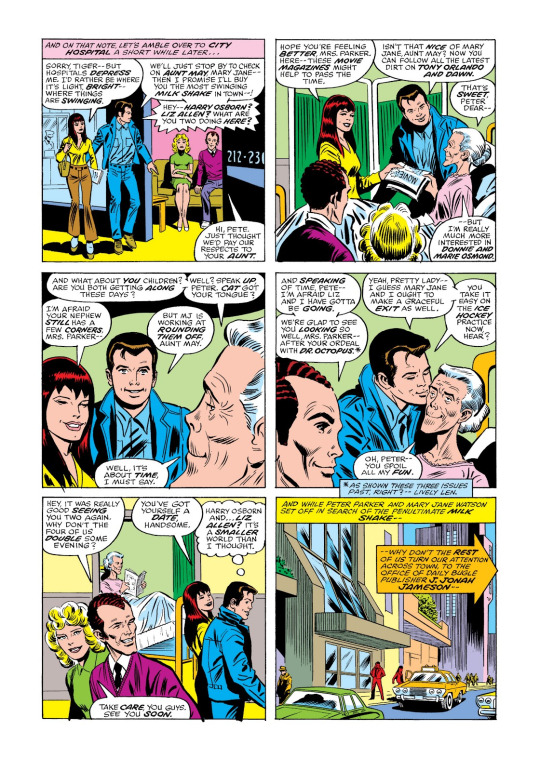
As always, I love these pages. Liz and Harry seem to get along well! That's nice to see.

I hope we get to see more secretaries, they're becoming a fun gag!
Spidey goes back to hunt the Spider-Mobile, and he finds it alright.
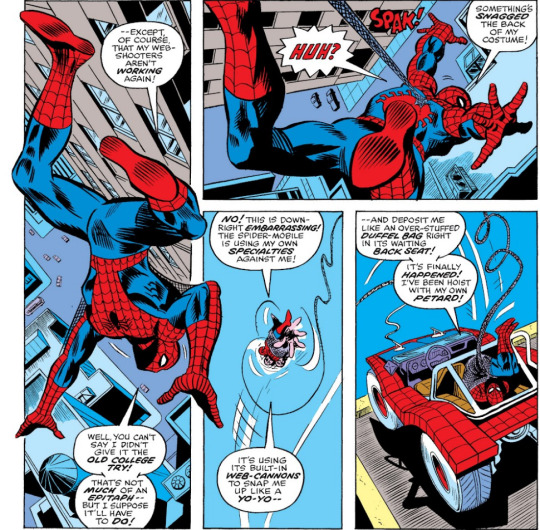
The buggie leads Spidey to... the Tinkerer, a villain we haven't seen since ASM #2!
No, I'm not missing any zero. I saw him recently since I worked on my Peter Parker Objectification series of posts so that was fun to recognize him.
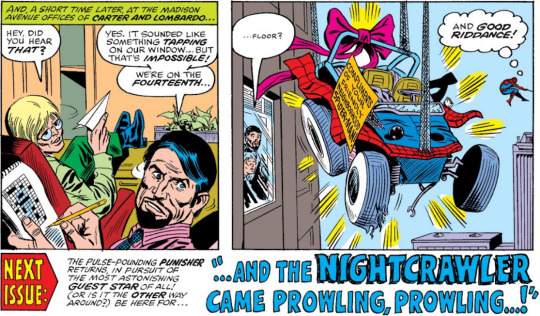
The Spider-Mobile saga has lasted, what, 2 years now? I think that was a good ending, since it was the star of the issue.
In #161, Nightcrawler is decided to attack our web-crawler! And not only him...

The Punisher hates seeing happy people. He's also dead set in making Peter's life harder! He's having a nice (if terrifying) date with MJ, and Harry and Liz are right behind their tails, having no lines, but loads of fun.
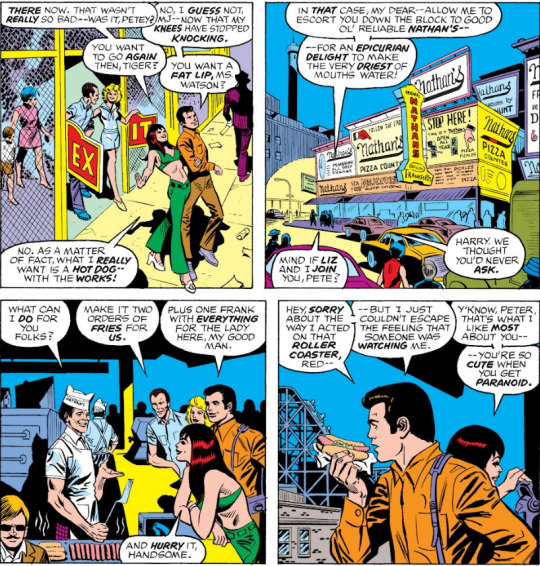
"Harry, we thought you'd never ask." awww! My heart's melting <3
Aside from Peter's naturally pretty face, it's just heartwarming to see everyone be so happy :) And MJ keeps loving destabilized Peter. As do I, my dear MJ.
Suddenly, the Punisher shoots someone dead. He escapes before being seen, but Nightcrawler and Spidey arrive just on time to suspect each other. Interestingly, Nightcrawler wanted to take the weapon to the police, something we've never really seen Spidey do, as he usually directly hands the people to them.
Nightcrawler figures surprisingly quickly that with his powers, Spider-Man would have no use for a rifle. Usually, it takes longer than that!
The X-Man eventually vanishes, and Spidey seeks help from Robertson. Jameson discovers them and listens in...
BEFORE REVEALING A PLOT TWIST.

Someone sent him photographies of Peter throwing his clone away! I didn't expect this plot point to come back, I thought it was pretty much dropped or would be retconned in like a decade or so.
That's so interesting though!
My first guess for who's this mysterious photographer would be Eddie Brock, but he hasn't been introduced yet.
Otherwise... An enemy who'd be back? But whom? The Tarantula? I think he was involved in those events, after all, but taking pictures from afar doesn't seem to be his style.
Hmm.....! I'm really excited to see a plot point that I'm not spoiled on :D
The Punisher, meanwhile, roughs up some gangster and says someone's been impersonating him. So... the Chameleon? Fascinating intrigue!
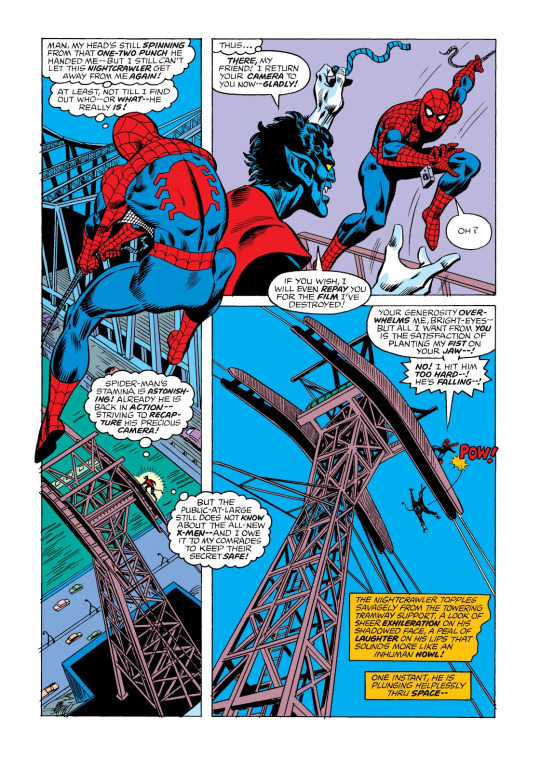
Ross Andru and his gigantic structures!
The Spider and the Crawler meet again, and Nightcrawler helpfully informs us that given that the current X-Men run only started recently (1975), the mutants aren't out to the public yet, and thus, nobody has ever heard of Nightcrawler and his friends.
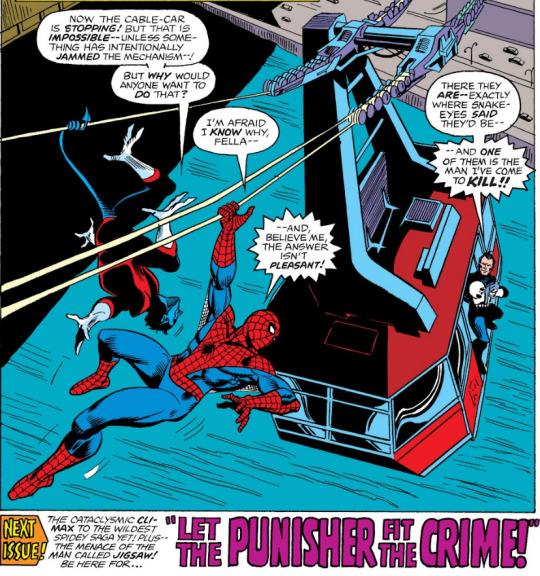
I'm just staring wide-eyed, curious about how this is going to progress.
#162 eventually sees the three characters see eye to eye.

More importantly, the Punisher and Spider-Man are a couple and I think that's very important.
The next day...

So first off, Peter misses Warren! I kind of understand. He might have been the Jackal, but Peter still had a somewhat close relationship with him.
Jameson's just there to rile up a new scientist to do his dirty bidding, yawn yawn.
The Punisher and Spidey investigate a neighborhood together, but Spidey gets captured and, uh...
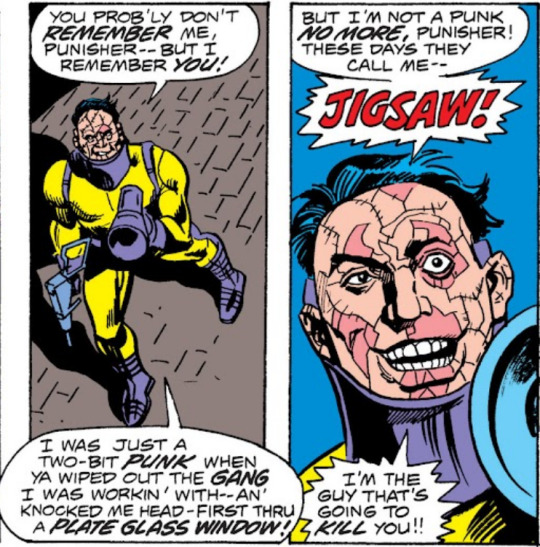
Okay...
Nightcrawler joins in, and our three protagonist fight hand in hand!
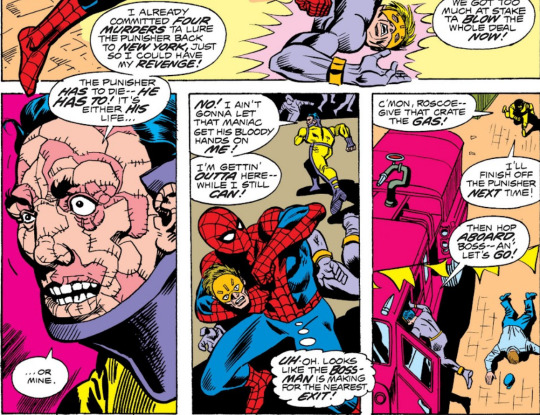
Okay...
Uh, whatever. Jigsaw's caught. Everything ends well.
In the post after the next one...

Oh, the Kingpin's back! I wonder how his family affairs are going. At least, I appreciate that we got rid of him for quite a while.
But next time, let's start Spectacular Spider-Man!
3 notes
·
View notes
Note
I am curious to know if you would "want" to see TK and Carlos dealing with homophobia on the show? Cause I love that the show didn't make a huge deal about them being gay as in them dancing in a bar together without problems (and generally never facing any problems in that regard - as far as i am aware?) and TK (on screen) never having to come out to the 126 or had to explain that he had a boyfriend - it was just normal (as it should be ) but unfortunately that's not how it always goes IRL and even tho it may be slightly different/better in Austin especially people in Texas are not as open minded that it's not an issue for some. And I feel like TK and Carlos would have very different reactions to it and the way Ronen/Rafa could play in their own experiences may be helpful for some people who have to deal with similar stuff?
This is a really fascinating question and I'm kind of on the fence about it tbh. I also like the way the show sort of tells their story without homophobia, it really is refreshing in a way because so, so often any kind of marginalized community only really gets their stories told through the lens of their collective trauma (gay people only get stories about fighting homophobia, black people only get stories about slaves, etc). So it's almost a bit revolutionary to have a canon queer couple that gets to exist and love each other in a fictional world where bigotry doesn't affect them. The only times it really does are like that one scene in a season one episode where that woman was bigoted against basically everyone and she was made the butt of the joke, and in the fact that Carlos thinks his parents have an issue with him being gay but then it turns out that they don't and the real villain in that story is a lack of communication and complicated family dynamics. I do like that a lot, that they get to just ... be. They both casually say "my boyfriend" to someone who they presumably haven't previously come out to (TK to the woman his dad is dating, Carlos to a detective he's working with), and neither of those people have any more reaction than they would if they'd said "my girlfriend". It's an idealized view of reality but its one that we all deserve and it's soothing to see it portrayed on network television.
But then on the other hand it isn't entirely realistic, especially where they live, and they're both such gifted dramatic actors and it would be good to show that side of things too because it is the world we actually live in. The actors coming out stories are sort of opposite to TK and Carlos interestingly, Rafa has said that his family was very loving and supportive basically right away and Ronen has talked about how he stayed in the closet for a long time because he was in physical danger from people in his family, but they could definitely use their own experiences to bring a lot of realism to those scenes if there was a storyline where they had to deal with some kind of bigotry. They're both so passionate about LGBTQ issues and they're both such committed advocates in that fight. It might be really powerful, to show that this incredibly strong couple do still face discrimination and that they fight it together and they lean on each other and they have the support of all the other people who love them.
Idk!! I rambled and I don't really have a good answer for you. I'd be so interested to hear what other people think.
18 notes
·
View notes
Text
Character breakdown: Panchaud
Panchaud is an underrated gem of a minor character in Les Misérables.
Whilst he only appears in two scenes in the novel, both relating to the Gorbeau ambush, I find him so fascinating, because he too (like Montparnasse) seems to have a reputation as a famous villain, or at least, he is working his way up to that status! Interestingly, there are a couple of very small indicators that perhaps suggest that he is a bit of a flâneur, even though we never definitively see this in action. We also get a glimpse into Panchaud’s life post-narrative, and he is one of only two Patron-Minette accomplices to end up doing time for the failed Gorbeau ambush.
Below I have compiled all the information that I can about his character and his various appearances in the novel, as well as my own short analysis of him!

He passed in the quartier for a pretty dangerous night rambler
Appearances and facts
Whilst we do not know much about Panchaud’s physical attributes, we receive some very interesting details that hint at his character despite his limited appearances in the text. We do not know his age, although he seems to be a quite a young man - more on this later. This appears to be common amongst the other Patron-Minette affiliates who feature in this novel too (with the exception of Boulatruelle, who is an old man).
My favourite thing about Panchaud is that he has two other alternative aliases, even though they are barely used in the text! For reference, his other aliases are Printanier or Bigrenaille (which Hugo plays for comedy, always listing off both of these aliases when mentioning Panchaud). The Julie Rose translation lists the literal meanings of each alias too, and interprets his names as ‘Hotwhack’ [Panchaud], ‘Springlike’ [Printanier], ‘Golightly’ [Bigrenaille].
Ironically though, despite all his aliases he is only really known by the name Panchaud, and seems to be building up a bit of a reputation with that name in 1832. What is particularly interesting to me is that Courfeyrac is described as having recognised Panchaud once before, and understood him to be a dangerous criminal, which certainly means he must have some level of reputation. I think this also acts as a great indicator of the general reputation of the Patron-Minette gang, because if Panchaud, who is merely an associate of the group, has a reputation, then clearly the four heads of the group would have (perhaps even larger) reputations also amongst locals.
Ahead of the Gorbeau ambush, Marius recognises Thénardier (who Marius still only knows as Jonderette at this stage in the text) talking to Panchaud
Yet, whatever his painful preoccupation, (Marius) could not help remarking to himself that the barrière prowler Jonderette was talking to looked very like a certain Panchaud, alias Printanier, alias Bigrenaille, whom Courfeyrac had once pointed out to him and who passed in the quartier for a pretty dangerous night rambler
I am fascinated that Thénardier speaks to Panchaud first about his plans for the ambush at Gorbeau house, rather than discussing it with any one of the four Patron-Minette leaders. In general this short sequence of plotting the Gorbeau ambush is so interesting to me because we only see the Patron-Minette affiliates (Panchaud, Brujon, and Demi-liard) discuss the heist ahead of time, rather than the gang’s leaders. Obviously, the plans for the Gorbeau ambush must have reached Gueulemer, Babet, Claquesous, and Montparnasse, but I am completely enthralled by the idea that one of the associates (likely Panchaud, as he was the first to find out about Thénardier’s plan) would have had to pass the news onto them.
•
Interlude: Panchaud as a flâneur?
Panchaud is described as a ‘barrière prowler’ in the Rose translation, and a ‘prowler of the barriers’ in the Hapgood translation. It has since occurred to me that perhaps this is alluding to the fact that he is a bit of a flâneur or a badaud (albiet it a significantly more sinister, criminal version of the figure).
The flâneur transgresses boundaries in the literal sense, with his strolls across the city, and also on a metaphorical level, as he is able to observe society whilst existing beyond its barriers [source]. Of course, we also see figures similar to flâneurs already feature in the novel (particularly at 3.1.5). These individuals are labelled as ‘thinkers’ who enjoy ‘wandering around musing’, and, most importantly in relation to Panchaud, are also described through the near-identical phrase ‘prowler of the barrières of Paris’. Further evidence to support the assertion that Panchaud exhibits some of the traits of a flâneur is the fact that he is explicitly labelled as a ‘night rambler’, which makes much more of an explicit, historical connection to origins of the flâneur figure (see Charles Baudelaire’s defining pieces on the figure in the early nineteenth century for more information).
Perhaps this also explains why it is Courfeyrac specifically who recognises Panchaud, since Courfeyrac too inhibits some of the traits of the flâneur, being too a bit of a ‘tom cat’ and likely to mix in similar evening escapades.
However, this is the only allusion we get to the idea that Panchaud might resemble the flâneur figure, so I shall not delve any further into the subject on this post. Nevertheless, I really do find it absolutely fascinating that these very brief details can give us more of an idea about Panchaud’s character, and perhaps even his age (as flâneurs were generally depicted as young men).
Anyway, let us get back to the rest of Panchaud’s appearances in the text!
•
The next time we see Panchaud, it is at the Gorbeau ambush. However, being only a Patron-Minette associate, he is not heavily involved in the scene. He arrives with Brujon, Demi-liard and Boulatruelle, and leans against the wall whilst the others sit on the bed (unfortunately there is no unique description of him here, I can only work out that it is Panchaud leaning against the wall by process of elimination - as the three other listed associates sitting on the bed are given recognisable, identifiable traits). He then wields ‘a sort of club consisting of an iron bar with a knob of lead at each end bludgeon made of two balls of lead’ against Valjean when he tries to escape, but is stopped from attacking him by Thénardier. He is later asked in the scene to untie Valjean’s hand, so that the letter can be written. Panchaud seems confident in his abilities to tie Valjean down, stating that ‘he won’t be going anywhere. Take my word for it. I’m the one who trussed up his paw for him’.
Before the cops arrive, Panchaud is shown to be arguing with Thénardier about who gets to flee the scene, grabbing him ‘roughly by the collar’ and declaring: ‘Oh, no you don’t, you old joker! Us first!’. When Javert does arrive at the Thénardier family’s lodgings, Panchaud reveals that he had a pistol on him the whole time (‘kept hidden in his smock’), handing it to Thénardier stating ‘I don’t dare shoot at that man. Do you?’. He really does seem terrified of Javert here, and he is also the first character to voluntary hand himself over to the cops - in exchange for some luxuries in prison, of course.
Javert calmly went on: ‘That's it, that's good, as I was saying, we can be nice.’
‘There's just one thing I'd like to ask for,’ Bigrenaille went on, ‘and that is that I'm allowed tobacco when I'm inside in solitary.’
‘Granted,’ said Javert.
However, this is not the end of Panchaud’s story. In 5.5.8, Panchaud makes his final (brief) appearance, and it is revealed to us that he was one of only two of the Patron-Minette characters to have been sentenced for his crimes during Gorbeau.
The affair had been left up in the air. The bench of the circuit court had had to make do with two underlings, Panchaud, alias Printanier, alias Bigrenaille, and Demi-liard, alias Deux-milliards, who had been sentenced in the presence of the parties involved to ten years in the galleys
•
Whilst this ten year sentence might look like the end for Panchaud, Hugo actually does give us some absolutely fascinating facts and information about this criminal’s life that extends beyond the narrative of Les Misérables. Specifically, Hugo suggests that at the time of his writing up of this story, some thirty years after the (fictional) events occurred, Panchaud had since become a ‘celebrity crook’.
This Panchaud, alias Printanier, alias Bigrenaille, later featured in several criminal proceedings and has since become a celebrity crook. At the time he was still only a notorious crook. Today he is a part of the tradition among gangsters and murderers. He had a real following toward the close of the last reign. And in the evening, at nightfall, at the hour when groups huddle together and speak in hushed voices, they used to talk about him in the exercise yard called the Lions’ Den at La Force. At that fabled prison, at the exact spot under the covered way where the sewer runs that was used in the incredible breakout in broad daylight of thirty detainees in 1843, you could even read, above the flagstones over the toilers, his name, PANCHAUD, boldly carved by the man himself on the parapet wall in one of his attempts at escape. In 1832, the police already had him under surveillance, but he had not yet seriously made his début
Clearly over the years, Panchaud had become a criminal of legend - growing far beyond his humble roots as a simple affiliate of the Patron-Minette!
I guess we also now know that Panchaud escaped prison after being sentenced to ten years for the Gorbeau ambush. Although, the maths doesn’t quite add up (probably a case of “Hugo maths” at play here), as Panchaud would have been very close to serving his full sentence anyway by 1843 and getting out, so I am not sure why he would stage a breakout then (unless of course there were previous escape attempts or further charges against him that we are none-the-wiser to, earning him extra time in La Force).
Also, the fact that he wrote his name on La Force’s wall as he escaped is a particularly lovely detail that makes me think back to the Brujon dynasty, where the notable Brujon of 1811 (aka ‘the father of the Brujon of 1832′ that we see affiliated with the Patron-Minette) also famously carved his name into the prison’s walls. Ah - I am just in love with the idea of La Force’s walls being carved out with all of the Patron-Minette leaders and associates over the years as they get arrested and subsequently try to escape.
•
A (brief) analysis of his character...
Panchaud is a good example of the theatrics and dramatics of crime that we see applied across the Patron-Minette as a group (I have previously written a separate post on this topic, you can read it here if you are interested!), since he transcends from a mere man in 1832 to a myth whose legendary talents are spoken of by criminals in La Force after the events of the narrative. He too arguably is a figure that reflects society’s fascination with crime and criminal figures, as evidenced in the existing “Penny Dreadfuls” and other literatures of the time that specifically were created to tell stories of thrilling criminals and their acts of evil. He is even explicitly labelled as becoming a ‘celebrity crook’!
The reputation that Panchaud has already acquired by 1832 also is particularly helpful to as readers as it enables us to better understand how the Patron-Minette might have generally been perceived by the other characters in Les Misérables. I have always been a little upset that Hugo says the group ‘ruled the dregs of Paris from 1830 to 1835′, yet we don’t often actually see the reputation that the Patron-Minette had in-action (e.g. Valjean never comments that it is the seemingly renowned Patron-Minette who are present during the Gorbeau ambush!). Yet, small, fleeting moments such as this - with Courfeyrac recognising Panchaud, a mere Patron-Minette affiliate, as such a dangerous character - really helps highlight the true notoriety of the gang.
Maybe I am overanalysing things (I almost certainly am), but Panchaud is also so interesting to me because he kind of reminds me of Montparnasse in terms of building up a criminal reputation as a prowler of the night. Perhaps it also the similarities between Montparnasse’s dandyism and Panchaud’s potential flâneur-like description given by Courfeyrac to Marius that intrigues me. Again, I am more than likely reading too much into this, but Montparnasse and Panchaud also share similarities in terms of their youthful, spring-like descriptions. Printanier literally translates to ‘Springlike’, and Montparnasse likewise has ‘the brightness of spring in his eyes’, so again I feel some nice (although limited) comparisons can be drawn between the two.
I genuinely adore Panchaud’s character, because despite the fact he only really properly features in one narrative event, he still feels fleshed out (much like how Brujon and Boulatruelle also do). The genius of Hugo’s characterisation really proves itself when we get down to minor characters like this and they still feel so complex, so complex that I have probably ended up writing more words analysing Panchaud than the number of words used to describe him in the text!
#panchaud#character breakdown#patron minette#patron-minette#patron minette affiliates#minor character appreciation#les miserables#les mis#meta
2 notes
·
View notes
Note
D, T, V
♡
Ooo those are interesting asks! I hope I shall do them justice!
D: A pairing you wished you liked, but you just can't.
Oof I've got a couple that I've really tried to like and they just don't click in my mind for some reason. Rex/Tup is a tricky one for me, mainly because of how most people write it. Any Bad Batch ship. I've tried to like them, but I really dislike how most of the fandom portrays them, and especially canon. It makes me upset and then I end up just not interacting with any TBB content at all.
T: Do you have hard and fast headcanons that you would die defending?
I've got a few yes XD. Mainly about Wooley (surprise surprise). I adore the headcanon that he is a fantastic storyteller and I will continue to spread that headcanon until it's accepted as fanon lol. I also definitely believe that Wooley should be an ARC trooper. Period. Beyond those, I don't think there are any that I would die defending. Maybe get into a fight about though Xb
V: Which character do you relate to most?
Hmm, that's an excellent question. Interestingly enough, I think I would relate to Dogma the most. That's why I can't consume a lot of fanon content out there because it hits a little too close to home for me. I'm extremely trusting and tend to be more of a passive follower. It's something I've been working on, and I used to be a very strict rule-follower--not so much anymore, but still to the point where breaking rules can cause anxiety. Seeing Dogma as always portrayed as the villain or the victim just doesn't sit well with me personally. That's why I latched onto Echo, because he and Dogma are very similar in personality in the show, but Echo is who I'm striving to be, and I see him treated a lot better in fanon than Dogma.
wow that answer turned depressing. Sorry about that ('oo)
Thank you very much for the ask my friend! It was fun to think about. I don't think I've ever considered which characters I relate to the most--too busy inventing a whole character for Wooley XD
2 notes
·
View notes
Text
the way the warrior code has always been presented in the books is so fascinating to me because... its unjust and always has been. the books simultaneously seem to know this and deny it. i have Complicated Feelings about it
even from the first arc, we’ve got silverstream tragically dying and graystripe’s crisis of loyalty due to the couple being technically illegal, half-clan cats being injustly targeted during tigerstars reign, firestar breaking the code to feed yellowfang, who herself broke the code, and going behind bluestars back to do whats right. bluestar and her kits, too, were victimized by the restrictions of the warrior code. even firestars unresolved feelings for spottedleaf apply. and sympathy almost always falls upon the codebreakers and half-clan cats. theyre almost always in the right. and yet still the subtext of always having faith in starclan, the code being just and honorable and what seperates them from just being pack of rogues, is still very present.
in arc 2 our protagonists, who grow to become friends, are shortly afterwards seperated once the journeys over and its presented as tragic that they have to be split by clan loyalty. its an arc about how the clans must come together and unite in times of crisis... and yet at the end of the day, they must be seperated because StarClan Says So!!! this bleeds into arc 3, really, since its so connected to what happens in arc 2. lives are nearly ruined over the restrictive nature of the warrior code. squirrelflight does whats right even if it means crossing societal boundaries by raising her sisters kits, and the revelation that the three are leafpool’s is seen as so catastrophic that someone gets LITERALLY MURDERED to prevent it from getting out. leafpool even says that she finds death preferable to facing all the consequences the warrior code would impose on her for simply having fallen in love. hollyleaf, the one most adherent to the code as a moral guide, has to reckon with realizing that it technically forbids her existence, as well as that the three are, inherently, kind of above it since they hold more power than starclan, their religious authority. this is a Thing in power of three... and then arc 4 veers hard back into StarClan Is Always Right. its a straightforward good vs evil story and starclan are “the good guys”
i dont have that much to say on DOTC because the code hadn’t been established yet, but i do think its interesting that clear sky’s closed borders and territorialism, which is very close to modern clan tradition, is seen as unreasonable and restrictive by the other characters (it is, the divisions between clans are very arbitrary). i dont have much to say on AVOS either tbh other than that it does kind of have a “the youth dont respect tradition!!1!!!” undercurrent. “see if you undermine authority everyone is going to die and get killed by rogues!!!!” though interestingly we do get to see some cats change clans to be with who they love, like dovewing.
and then we get to TBC and ASC, which are interesting in that the code is being dismantled. a starclan cat, ashfur, the villain of TBC, uses it to leverage power against cats he dislikes by labeling them as codebreakers, the main romance of the arc is forbidden by the code (and this is presented as a tragedy that they could never get to be together). starclan encourages them to change the code, and it does criticize the way clan society, well.... works. and ASC is going to be about all the ways the code will be changed and altered! awesome! and yet i still dont think theyve gone far enough. ashfur being a starclan cat who exploits his position as a religious guide (and eventually as leader) is presented as an outlier, a mistake, not a “real” starclan cat (which is bullshit). dead cats who were once evil but switched sides in TPONS and ALITM arent allowed to leave the Evil Torment Dimension despite having fought to save the clans and showed genuine change, because “starclan said so, they dont make mistakes, especially not when they sent you to the dark forest lol”. its a bewildering decision and i wish they just decided to make starclan kind of morally questionable Explicitly. they keep dancing around this idea and never going hard with it. and i could go on and on about the unfair starclan trial in squirrelflights hope and all that but this post is long enough...
idk how to conclude this other than... i wish this was all intentional, that the erins had conceived the clans as a deeply flawed society that the protagonists try to navigate within and eventually dismantle, rather than kind of accidentally backflipping into having created a restrictive, shitty place without meaning to. the code throughout the series has caused tragedy after tragedy and yet solved very little. if this was an intentional narrative about questioning tradition and the constraints of society, warrior cats would be literally incredible! but in practice it reads like the erins trying to have their cake and eat it too. it makes warriors really weird to read as an adult with a critical eye. i KEPT noticing this over and over when i reread the series last year. hopefully ASC will develop these ideas further
250 notes
·
View notes
Text
fan language: the victorian imaginary and cnovel fandom
there’s this pinterest image i’ve seen circulating a lot in the past year i’ve been on fandom social media. it’s a drawn infographic of a, i guess, asian-looking woman holding a fan in different places relative to her face to show what the graphic helpfully calls “the language of the fan.”
people like sharing it. they like thinking about what nefarious ancient chinese hanky code shenanigans their favorite fan-toting character might get up to—accidentally or on purpose. and what’s the problem with that?
the problem is that fan language isn’t chinese. it’s victorian. and even then, it’s not really quite victorian at all.
--------------------
fans served a primarily utilitarian purpose throughout chinese history. of course, most of the surviving fans we see—and the types of fans we tend to care about—are closer to art pieces. but realistically speaking, the majority of fans were made of cheaper material for more mundane purposes. in china, just like all around the world, people fanned themselves. it got hot!
so here’s a big tipoff. it would be very difficult to use a fan if you had an elaborate language centered around fanning yourself.
you might argue that fine, everyday working people didn’t have a fan language. but wealthy people might have had one. the problem we encounter here is that fans weren’t really gendered. (caveat here that certain types of fans were more popular with women. however, those tended to be the round silk fans, ones that bear no resemblance to the folding fans in the graphic). no disrespect to the gnc old man fuckers in the crowd, but this language isn’t quite masc enough for a tool that someone’s dad might regularly use.
folding fans, we know, reached europe in the 17th century and gained immense popularity in the 18th. it was there that fans began to take on a gendered quality. ariel beaujot describes in their 2012 victorian fashion accessories how middle class women, in the midst of a top shortage, found themselves clutching fans in hopes of securing a husband.
she quotes an article from the illustrated london news, suggesting “women ‘not only’ used fans to ‘move the air and cool themselves but also to express their sentiments.’” general wisdom was that the movement of the fan was sufficiently expressive that it augmented a woman’s displays of emotion. and of course, the more english audiences became aware that it might do so, the more they might use their fans purposefully in that way.
notice, however, that this is no more codified than body language in general is. it turns out that “the language of the fan” was actually created by fan manufacturers at the turn of the 20th century—hundreds of years after their arrival in europe—to sell more fans. i’m not even kidding right now. the story goes that it was louis duvelleroy of the maison duvelleroy who decided to include pamphlets on the language with each fan sold.
interestingly enough, beaujot suggests that it didn’t really matter what each particular fan sign meant. gentlemen could tell when they were being flirted with. as it happens, meaningful eye contact and a light flutter near the face may be a lingua franca.
so it seems then, the language of the fan is merely part of this victorian imaginary we collectively have today, which in turn itself was itself captivated by china.
--------------------
victorian references come up perhaps unexpectedly often in cnovel fandom, most often with regards to modesty.
it’s a bit of an awkward reference considering that chinese traditional fashion—and the ambiguous time periods in which these novels are set—far predate victorian england. it is even more awkward considering that victoria and her covered ankles did um. imperialize china.
but nonetheless, it is common. and to make a point about how ubiquitous it is, here is a link to the twitter search for “sqq victorian.” sqq is the fandom abbreviation for shen qingqiu, the main character of the scum villain’s self-saving system, by the way.
this is an awful lot of results for a search involving a chinese man who spends the entire novel in either real modern-day china or fantasy ancient china. that’s all i’m going to say on the matter, without referencing any specific tweet.
i think people are aware of the anachronism. and i think they don’t mind. even the most cursory research reveals that fan language is european and a revisionist fantasy. wikipedia can tell us this—i checked!
but it doesn’t matter to me whether people are trying to make an internally consistent canon compliant claim, or whether they’re just free associating between fan facts they know. it is, instead, more interesting to me that people consistently refer to this particular bit of history. and that’s what i want to talk about today—the relationship of fandom today to this two hundred odd year span of time in england (roughly stuart to victorian times) and england in that time period to its contemporaneous china.
things will slip a little here. victorian has expanded in timeframe, if only because random guys posting online do not care overly much for respect for the intricacies of british history. china has expanded in geographic location, if only because the english of the time themselves conflated china with all of asia.
in addition, note that i am critiquing a certain perspective on the topic. this is why i write about fan as white here—not because all fans are white—but because the tendencies i’m examining have a clear historical antecedent in whiteness that shapes how white fans encounter these novels.
i’m sure some fans of color participate in these practices. however i don’t really care about that. they are not its main perpetrators nor its main beneficiaries. so personally i am minding my own business on that front.
it’s instead important to me to illuminate the linkage between white as subject and chinese as object in history and in the present that i do argue that fannish products today are built upon.
--------------------
it’s not radical, or even new at all, for white audiences to consume—or create their own versions of—chinese art en masse. in many ways the white creators who appear to owe their whole style and aesthetic to their asian peers in turn are just the new chinoiserie.
this is not to say that white people can’t create asian-inspired art. but rather, i am asking you to sit with the discomfort that you may not like the artistic company you keep in the broader view of history, and to consider together what is to be done about that.
now, when i say the new chinoiserie, i first want to establish what the original one is. chinoiserie was a european artistic movement that appeared coincident with the rise in popularity of folding fans that i described above. this is not by coincidence; the european demand for asian imports and the eventual production of lookalikes is the movement itself. so: when we talk about fans, when we talk about china (porcelain), when we talk about tea in england—we are talking about the legacy of chinoiserie.
there are a couple things i want to note here. while english people as a whole had a very tenuous knowledge of what china might be, their appetites for chinoiserie were roughly coincident with national relations with china. as the relationship between england and china moved from trade to out-and-out wars, chinoiserie declined in popularity until china had been safely subjugated once more by the end of the 19th century.
the second thing i want to note on the subject that contrary to what one might think at first, the appeal of chinoiserie was not that it was foreign. eugenia zuroski’s 2013 taste for china examines 18th century english literature and its descriptions of the according material culture with the lens that chinese imports might be formative to english identity, rather than antithetical to it.
beyond that bare thesis, i think it’s also worthwhile to extend her insight that material objects become animated by the literary viewpoints on them. this is true, both in a limited general sense as well as in the sense that english thinkers of the time self-consciously articulated this viewpoint. consider the quote from the illustrated london news above—your fan, that object, says something about you. and not only that, but the objects you surround yourself with ought to.
it’s a bit circular, the idea that written material says that you should allow written material to shape your understanding of physical objects. but it’s both 1) what happened, and 2) integral, i think, to integrating a fannish perspective into the topic.
--------------------
japanning is the name for the popular imitative lacquering that english craftspeople developed in domestic response to the demand for lacquerware imports. in the eighteenth century, japanning became an artform especially suited for young women. manuals were published on the subject, urging young women to learn how to paint furniture and other surfaces, encouraging them to rework the designs provided in the text.
it was considered a beneficial activity for them; zuroski describes how it was “associated with commerce and connoisseurship, practical skill and aesthetic judgment.” a skillful japanner, rather than simply obscuring what lay underneath the lacquer, displayed their superior judgment in how they chose to arrange these new canonical figures and effects in a tasteful way to bring out the best qualities of them.
zuroski quotes the first english-language manual on the subject, written in 1688, which explains how japanning allows one to:
alter and correct, take out a piece from one, add a fragment to the next, and make an entire garment compleat in all its parts, though tis wrought out of never so many disagreeing patterns.
this language evokes a very different, very modern practice. it is this english reworking of an asian artform that i think the parallels are most obvious.
white people, through their artistic investment in chinese material objects and aesthetics, integrated them into their own subjectivity. these practices came to say something about the people who participated in them, in a way that had little to do with the country itself. their relationship changed from being a “consumer” of chinese objects to becoming the proprietor of these new aesthetic signifiers.
--------------------
i want to talk about this through a few pairs of tensions on the subject that i think characterize common attitudes then and now.
first, consider the relationship between the self and the other: the chinese object as something that is very familiar to you, speaking to something about your own self vs. the chinese object as something that is fundamentally different from you and unknowable to you.
consider: [insert character name] is just like me. he would no doubt like the same things i like, consume the same cultural products. we are the same in some meaningful way vs. the fast standard fic disclaimer that “i tried my best when writing this fic, but i’m a english-speaking westerner, and i’m just writing this for fun so...... [excuses and alterations the person has chosen to make in this light],” going hand-in-hand with a preoccupation with authenticity or even overreliance on the unpaid labor of chinese friends and acquaintances.
consider: hugh honour when he quotes a man from the 1640s claiming “chinoiserie of this even more hybrid kind had become so far removed from genuine Chinese tradition that it was exported from India to China as a novelty to the Chinese themselves”
these tensions coexist, and look how they have been resolved.
second, consider what we vest in objects themselves: beaujot explains how the fan became a sexualized, coquettish object in the hands of a british woman, but was used to great effect in gilbert and sullivan’s 1885 mikado to demonstrate the docility of asian women.
consider: these characters became expressions of your sexual desires and fetishes, even as their 5’10 actors themselves are emasculated.
what is liberating for one necessitates the subjugation and fetishization of the other.
third, consider reactions to the practice: enjoyment of chinese objects as a sign of your cosmopolitan palate vs “so what’s the hype about those ancient chinese gays” pop culture explainers that addressed the unconvinced mainstream.
consider: zuroski describes how both english consumers purchased china in droves, and contemporary publications reported on them. how:
It was in the pages of these papers that the growing popularity of Chinese things in the early eighteenth century acquired the reputation of a “craze”; they portrayed china fanatics as flawed, fragile, and unreliable characters, and frequently cast chinoiserie itself in the same light.
referenda on fannish behavior serve as referenda on the objects of their devotion, and vice versa. as the difference between identity and fetish collapses, they come to be treated as one and the same by not just participants but their observers.
at what point does mxtx fic cease to be chinese?
--------------------
finally, it seems readily apparent that attitudes towards chinese objects may in fact have something to do with attitudes about china as a country. i do not want to suggest that these literary concerns are primarily motivated and begot by forces entirely divorced from the real mechanics of power.
here, i want to bring in edward said, and his 1993 culture and imperialism. there, he explains how power and legitimacy go hand in hand. one is direct, and one is purely cultural. he originally wrote this in response to the outsize impact that british novelists have had in the maintenance of empire and throughout decolonization. literature, he argues, gives rise to powerful narratives that constrain our ability to think outside of them.
there’s a little bit of an inversion at play here. these are chinese novels, actually. but they’re being transformed by white narratives and artists. and just as i think the form of the novel is important to said’s critique, i think there’s something to be said about the form that fic takes and how it legitimates itself.
bound up in fandom is the idea that you have a right to create and transform as you please. it is a nice idea, but it is one that is directed towards a certain kind of asymmetry. that is, one where the author has all the power. this is the narrative we hear a lot in the history of fandom—litigious authors and plucky fans, fanspaces always under attack from corporate sanitization.
meanwhile, said builds upon raymond schwab’s narrative of cultural exchange between european writers and cultural products outside the imperial core. said explains that fundamental to these two great borrowings (from greek classics and, in the so-called “oriental renaissance” of the late 18th, early 19th centuries from “india, china, japan, persia, and islam”) is asymmetry.
he had argued prior, in orientalism, that any “cultural exchange” between “partners conscious of inequality” always results in the suffering of the people. and here, he describes how “texts by dead people were read, appreciated, and appropriated” without the presence of any actual living people in that tradition.
i will not understate that there is a certain economic dynamic complicating this particular fannish asymmetry. mxtx has profited materially from the success of her works, most fans will not. also secondly, mxtx is um. not dead. LMAO.
but first, the international dynamic of extraction that said described is still present. i do not want to get overly into white attitudes towards china in this post, because i am already thoroughly derailed, but i do believe that they structure how white cnovel fandom encounters this texts.
at any rate, any profit she receives is overwhelmingly due to her domestic popularity, not her international popularity. (i say this because many of her international fans have never given her a cent. in fact, most of them have no real way to.) and moreover, as we talk about the structure of english-language fandom, what does it mean to create chinese cultural products without chinese people?
as white people take ownership over their versions of stories, do we lose something? what narratives about engagement with cnovels might exist outside of the form of classic fandom?
i think a lot of people get the relationship between ideas (the superstructure) and production (the base) confused. oftentimes they will lob in response to criticism, that look! this fic, this fandom, these people are so niche, and so underrepresented in mainstream culture, that their effects are marginal. i am not arguing that anyone’s cql fic causes imperialism. (unless you’re really annoying. then it’s anyone’s game)
i’m instead arguing something a little bit different. i think, given similar inputs, you tend to get similar outputs. i think we live in the world that imperialism built, and we have clear historical predecessors in terms of white appetites for creating, consuming, and transforming chinese objects.
we have already seen, in the case of the fan language meme that began this post, that sometimes we even prefer this white chinoiserie. after all, isn’t it beautiful, too?
i want to bring discomfort to this topic. i want to reject the paradigm of white subject and chinese object; in fact, here in this essay, i have tried to reverse it.
if you are taken aback by the comparisons i make here, how can you make meaningful changes to your fannish practice to address it?
--------------------
some concluding thoughts on the matter, because i don’t like being misunderstood!
i am not claiming white fans cannot create fanworks of cnovels or be inspired by asian art or artists. this essay is meant to elaborate on the historical connection between victorian england and cnovel characters and fandom that others have already popularized.
i don’t think people who make victorian jokes are inherently bad or racist. i am encouraging people to think about why we might make them and/or share them
the connections here are meant to be more provocative than strictly literal. (e.g. i don’t literally think writing fanfic is a 1-1 descendant of japanning). these connections are instead meant to 1) make visible the baggage that fans of color often approach fandom with and 2) recontextualize and defamiliarize fannish practice for the purposes of honest critique
please don’t turn this post into being about other different kinds of discourse, or into something that only one “kind” of fan does. please take my words at face value and consider them in good faith. i would really appreciate that.
please feel free to ask me to clarify any statements or supply more in-depth sources :)
1K notes
·
View notes
Text
The Chinese Cultural Inspirations for Dragon Ball Z and Super
Journey to the West was only the beginning.
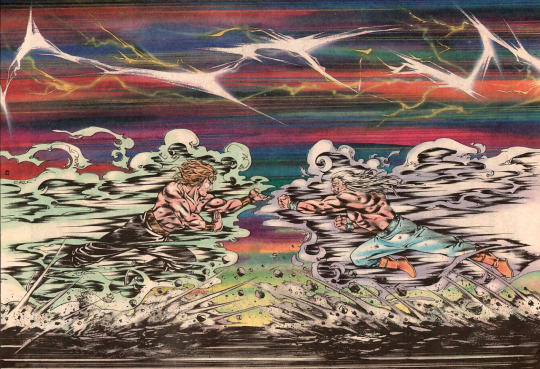
A lot of people are vaguely aware that Dragon Ball was inspired by Chinese culture and Hong Kong Kung Fu movies and novels, but are unaware of how deep and long lasting it goes. The Japanese spent the 1980s fascinated by China, which opened up from being a closed society for decades in 1978; the most famous human being in Japan in the 80s was either Michael Jackson or Jackie Chan.
In fact, a lot of people commonly believe that the Chinese action movie and Kung Fu novel cultural and media influence on Dragon Ball ended very early on. This is untrue. Sure, we started to see qipaos and cheongsams less frequently when they headed to West City, but it absolutely did not finish, because there’s tons of influence to see even as impossibly late as Dragon Ball Super. Interestingly, I don’t think any of these point of inspirations have been pointed out before, mainly because a lot of Chinese adventure novels are simply not available in English.
The Piccolo/Gohan plot was inspired by the Chinese action novel “Heavenly Sword and Dragon Sabre.”

Okay, tell me if you’ve heard this story before: a truly demonic, weird looking monster villain is defeated by a martial arts hero, but by circumstance, is forced into training his greatest enemy’s young son. The villain trains the young boy, the son of his enemy, in martial arts and over time, becomes like a second father or uncle to him and his family, putting the boy in his “evil” sect, and thanks to his love of his rival’s son, this baddie turns over a new leaf and goes from evil to just…grumpy, and becomes a loyal, though gruff, ally of the boy.
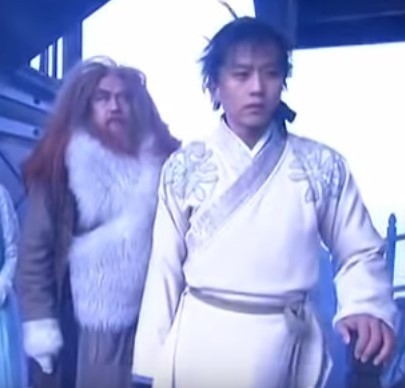
Of course, the events of Heavenly Sword and Dragon Sabre are a bit different from Dragon Ball in details. The Lion King becomes Wuji’s teacher because they are both stranded together on an island after a shipwreck, for instance, and he is blinded and made vulnerable. Also, the Lion King wasn’t so much evil so much as he was misunderstood by the orthodox martial world. However, in broad outlines, this trajectory for a face turn (becomes friends with his greatest enemy’s son, and becomes like a second father to him as he trains him, causing the villain to become a gruff good guy and ally) is essentially from one of the most famous Chinese novels ever written in the 1960s.
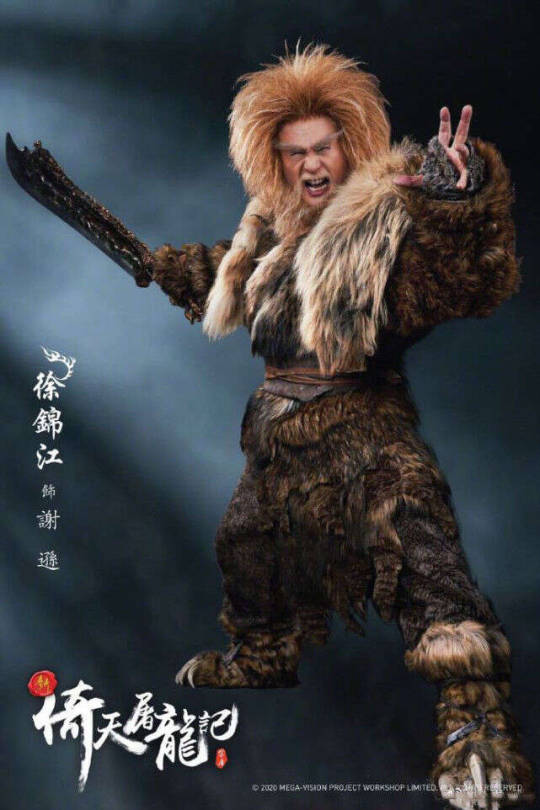
Oh, and while we’re at it, Gohan is likewise inspired by another character from a Louis Cha novel: the Prince of Dali Duan Yu in the Kung Fu novel Demigods and Semi-Devils. The Prince in that novel is a naïve, pacifistic scholar who prefers books to fighting, and who was raised to be timid and avoid combat, absolutely out of step with his family, all of whom are martial artists and warriors. In fact, the beginning of the story is the prince gets incredibly lost in the wilderness, where the hopelessly naïve prince is utterly out of his depth, with all the robbers and scary beasts, and needs to be saved by real martial artists that protect him like fairy godparents. He spends the first part of the story running away from everything, scared as hell. However, by circumstance, he has naturally high power he cannot fully initially control, and eventually realizes that even scholars and others who hate fighting have to sometimes become fighters to protect those they love.
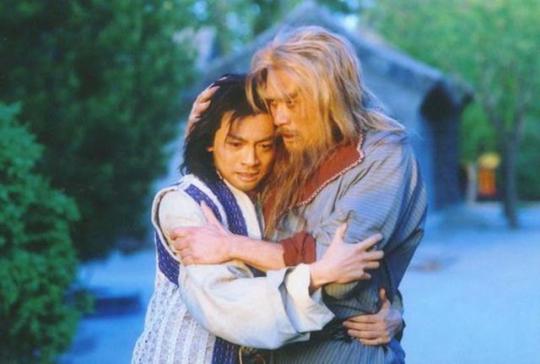
The Duan Yu part of Demigods and Semi-Devils was made into a film, the Battle Wizard, which was reviewed by PewDiePie. The Dragonball similarities went over his head because, honestly, PewDiePie does not strike me as a perceptive person.
Hit was based on the screen persona of Chow Yun Fat.
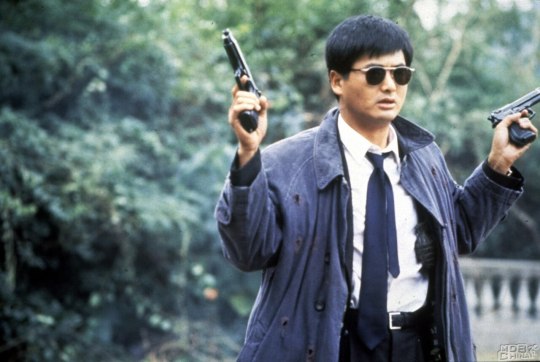
Chow Yun Fat was a Hong Kong cinema superstar who was to director John Woo what Robert de Niro was to Martin Scorsese. There are three giveaways that Hit was based on Chow Yun Fat. One, he’s an assassin, same as Chow Yun Fat’s character in the Killer, and is even given a sequence that’s a John Woo homage with an assassination in an office building with guns pulled on an empty elevator in an act of misdirection. Second, he’s wearing the single piece of clothing Chow Yun Fat is associated with, a black trenchcoat (fun fact: in Hong Kong today, trenchcoats are called Brother Mark Coats, after Chow Yun Fat’s character in John Woo’s A Better Tomorrow). Third, his power is essentially bullet time, a visual technique refined by John Woo in Hong Kong in the 80s and 90s in his gunplay triad movies starring Chow Yun Fat (what, you think the Wachowskis invented it?).
The Goku/Vegeta relationship is from “Legend of the Condor Heroes.”
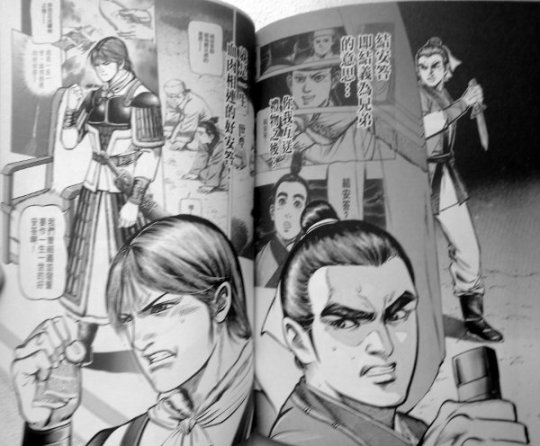
Here’s a story you might have heard before. It’s about two rivals, but by circumstance, one is raised in the wilderness beyond civilization, where he becomes an honest and goodhearted, though overly naive bumpkin, martial arts prodigy. The other is raised a wealthy prince by a conquering enemy, who grows up to also become an armor wearing martial arts expert, but also a cunning, arrogant, emotionally distant sociopath.
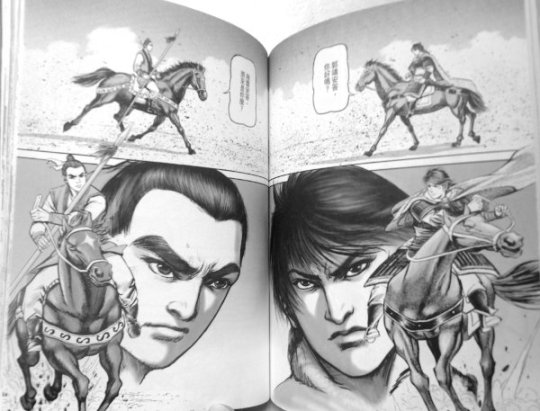
The similarities go into their love lives, too. The unsophisticated bumpkin hero is betrothed to a daughter of a powerful bearded barbarian king against his will, while the one hint of vulnerability and loss of emotional detachment in the otherwise sociopathic prince, the crack in his smirky arrogance, is that he loves a girl he otherwise pretends to hate, and even fathers a child with her who becomes a main character later.
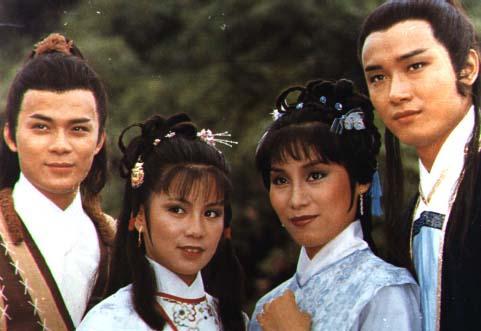
This is Guo Jing and Yang Kang from Legend of the Condor Heroes. The most fascinating similarity, and proof that female psychology is the same all over the world, is that the fangirls love the emotionally distant, arrogant, and sexy/evil prince (remember when Rhonda Rousey said her first crush was Vegeta?). Girls everywhere love bad boys and sexy villains, and oh boy, do they love Prince Yang Kang. I think you can probably guess who all the fan art is about for Legend of the Condor Heroes, and what ship is the most popular.
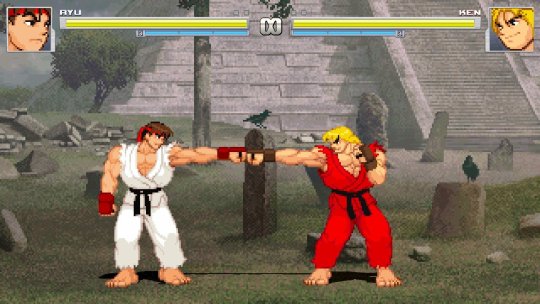
I have to emphasize that Legend of the Condor Heroes, which came out in the 1950s-60s, is possibly the most widely read novel by the most widely read novelist on earth - the sales on that dwarf Twilight and Harry Potter. It’s probably not an exaggeration to say nearly every Chinese person, even if they never read it, knows who these characters are. In fact, Yang Kang and Guo Jing from Condor Heroes are basically repeated over and over in Asian, Chinese, and Japanese culture. Does the unsophisticated but gifted martial arts prodigy bumpkin hero, and the glib, arrogant wealthy prince rival remind you of….another duo of rivals?
Gohan/Videl comes from Little Dragon Maiden
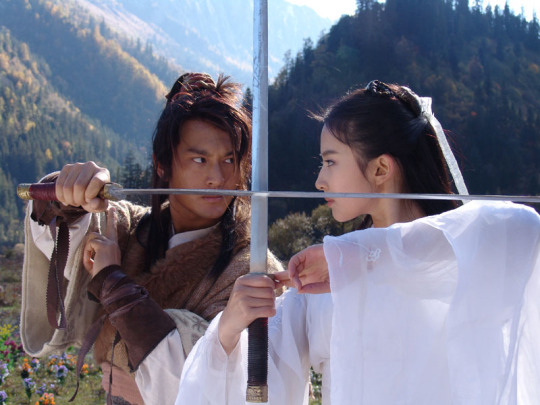
One of the most important and influential Martial Arts novels of all time is “Return of the Condor Heroes.” A sequel to Condor Heroes, this time, the main character is the teenage son of one of the main characters from the first novel. It gets even more familiar from there.
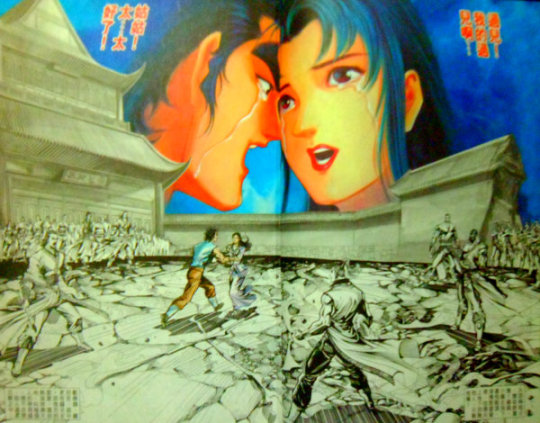
“Return of the Condor Heroes” was about a martial arts couple who are also master and student, the same age but vastly different in experience and skill so one somehow seems “older,” and they fall in love because the circumstances of training together requires they spend lots of time together and become intimate. The training story and the love story are exactly the same in “Return of the Condor Heroes.” The dead giveaway one story inspired the other is that in both, the most significant training sequence is one where the master teaches the student how to fly (though Return used a chamber of sparrows for lightness Kung Fu).

There are some differences of course – obviously in Return of the Condor Heroes, the genders of teacher and student are flipped from Gohan and Videl (it’s the Little Dragon Maiden who is a powerful teacher, and the boy who is the student). It was the girl (Videl) who was a rebellious delinquent in Dragon Ball Z, when it was the opposite in the novel, true. But it was obvious this story was in the back of the creator’s mind as a way to combine Kung Fu with the love story, by making teacher and student lovers.
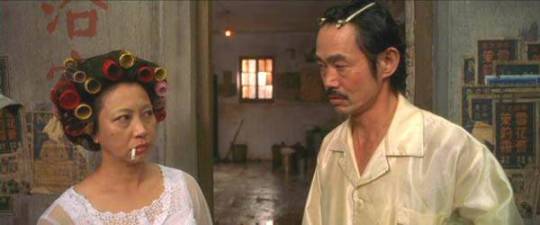
Addendum: hey, remember that awesome movie Kung Fu Hustle, the one Hong Kong movies normies have seen? Well, remember the landlord and landlady? The landlady was named Xiao Lung Nu, or Little Dragon Maiden, and her husband was named Yang Guo – the same as the main characters in Return of the Condor Heroes. It was a joke that went over the heads of Westerners, by giving these names of attractive and naïve young people in love with each other to a surly, bitter, arguing and chain smoking middle aged couple who don’t give a damn.
Going Super Saiyan comes from “Reincarnated” aka “Bastard Swordsman.”
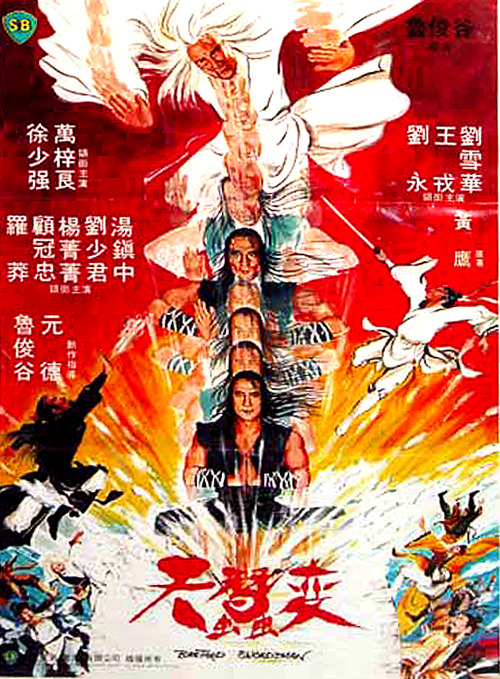
Stop me if this sounds familiar: a terrifying warlord tyrant prone to killing underlings who displease him has achieved a level of skill and cultivation so tremendous nobody can stop him. But there is one, and only one, thing he fears and that can defeat him: a long-lost legendary skill that nobody has achieved in recent memory, that includes a supernatural combat power transformation that turns the hair light to indicate it worked.
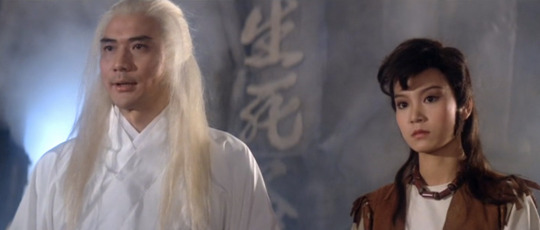
This is “Silkworm Skill” from Reincarnated aka Bastard Swordsman, a novel and TV series from Hong Kong in the early 1980s. Of course, there are differences. To get the power boost and new hair color, the hero has to jump in a cocoon he weaves himself. In fact, the scene is so well known that they actually have it on the poster.

(To those saying “Super Saiyan turns your hair blonde, not white” my response is that it turns hair white, or uncolored, in the comic book.)
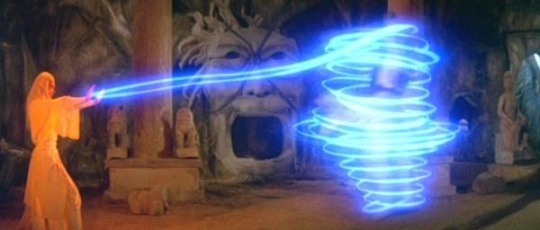
The idea of your hair turning white to indicate a new supernatural combat transformation or martial state wasn’t created by Bastard Swordsman, though – though it is the best example and probably the one most familiar to a 1980s audience due to the hugely popular books and TV series. For an older example, a famous Chinese movie based on a folktale is “Bride With the White Hair,” about a bride who’s hair turns white when she is betrayed, in her anger, she becomes less a woman and more a supernatural creature of vengeance (interesting that anger should be the means to unlock it).
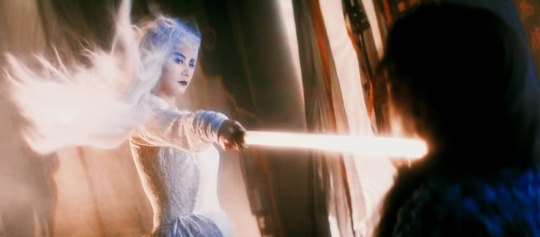
1K notes
·
View notes
Text
new 52 riddler origin/timeline
I noticed an older 2017 post by @batriddler about Edward’s possible New 52 origin story was going around again, so I thought I’d make a timeline adding what we’ve learned about his origins since then through The Riddler: Year of the Villain (2019).
Childhood
So Year of the Villain brings back several elements of Edward’s original backstory. The first was that, as a child, he won a puzzle contest and became fixated on that moment of victory for the rest of his life.
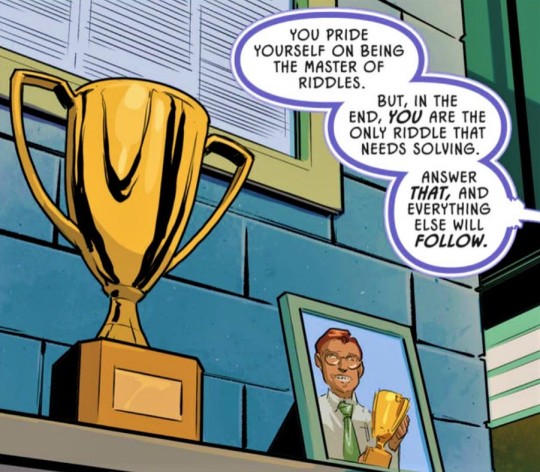
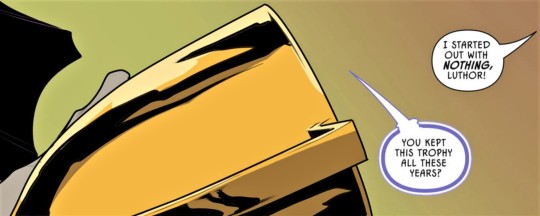
Unlike previous iterations of the character, however, there’s no obvious indication that Edward cheated in order to win it (other than the looming shadow of his future careers). Whether he won it fairly or not, winning the trophy was a turning point for him because it was the first time he was given undiluted positive attention, something he wasn’t getting at home.
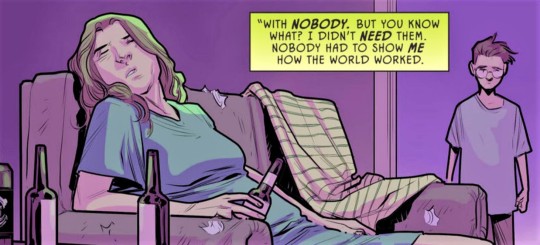
Edward’s mother is heavily, HEAVILY implied to be an alcoholic (like there are even more bottles lying around in this panel, I cut them out for the screenshot), and he himself implies in the narration that she was neglectful to the point that he pretty much had to raise himself. Interestingly, there’s no mention of an abusive father, which is the bog standard for Riddler backstories in previous continuities. There’s nothing contradicting the existence of an abusive father in addition, so obviously there’s room for headcanons here (though I’m enjoying that Jonathan’s New 52 daddy issues replacing his retconned Post-Crisis mommy issues was finally mirrored by Edward’s Post-Crisis daddy issues being retconned and replaced with New 52 mommy issues. It’s equality).
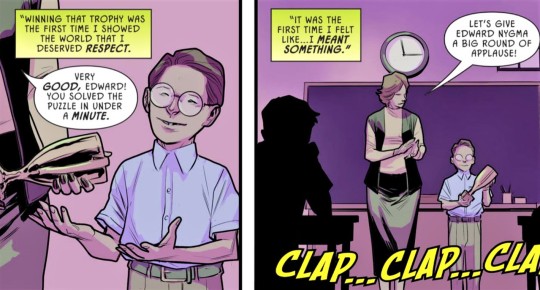
[Side note: apparently his actual birth name in the New 52 IS Edward “Nygma,” which is also a return to form to his first origin. Personally I’m much fonder of him being born “Nashton” and changing his name as an adult, but that’s just me.]
He says that winning the trophy was the first time he “felt like [he] meant something,” which would seem to indicate that before this he’d internalized his mother’s neglect into a low sense of self worth. Unfortunately, it doesn’t seem like the high of winning it lasted very long, since his classmates weren’t very appreciative of his victory (which is also very in line with Edward’s previous origins, especially Chuck Dixon’s take in Questions Multiple the Mystery).

There’s not much other information about his childhood available, though Batman Annual #4 does seem to indicate that unlike many of Batman’s other villains, he did grow up in Gotham.

This is just based on him telling Bruce that “all of Gotham City” watched him grow up, and that Edward in particular read and watched a lot of tabloid news about Bruce when they were adolescents (is this a Batman Forever reference??? It’s probably not a Batman Forever reference).
Teenage Years
Assuming we’re supposed to take Bruce’s heat-of-the-moment psychoanalysis in Zero Year seriously (Edward is clearly irritated by it, so... confirmation?), Edward’s desire for attention in childhood results in him breaking into corporate data banks and government safe-blocks as a teenager.
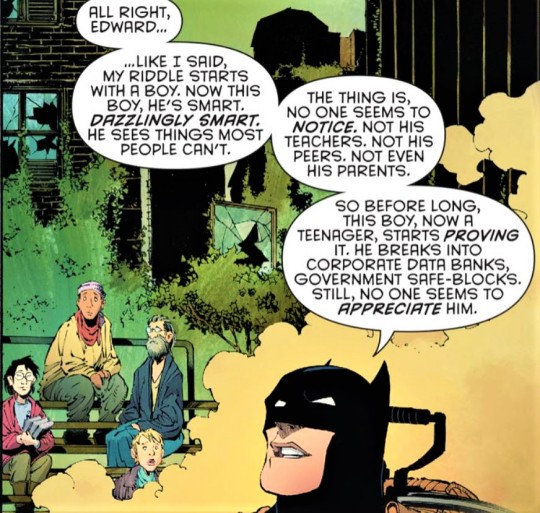
Given what Edward is capable of in Zero Year, this definitely doesn’t seem out of the realm of possibility, but it’s deeply hilarious in the context of what Year of the Villain confirmed he was (also?) doing as a teenager, which is working as a carnie.
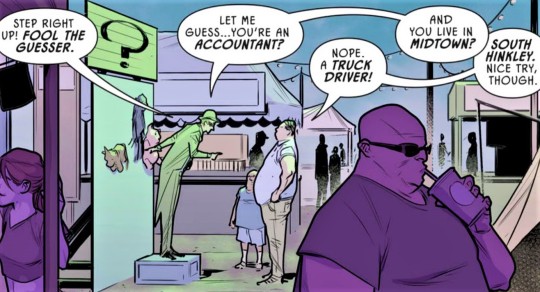
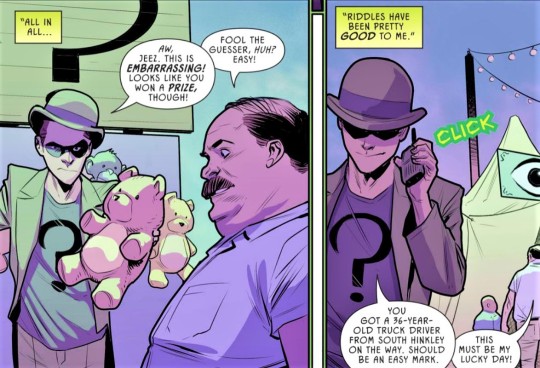
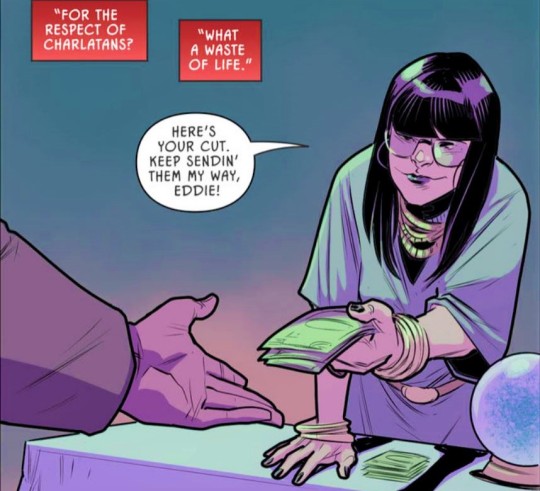
I cannot tell you how hilarious I would find it if THIS is the “questionable past” that Bruce’s Uncle Phillip was talking about during Zero Year, but presumably he’s referring to the same kind of high profile crimes that Bruce was.

But seriously, how funny would it be if he was just talking about how Edward literally ran away from home to join the circus as a teenager...
Adulthood
The 2017 post theorizes that Edward started working for Phillip at Wayne Enterprises in his early twenties, and started earning the various degrees you can see stacked up in a corner in the image above during his employment there. That would seem to fit with this timeline, since I’m not willing to add “earned six different university degrees” to teenage years that are apparently already packed full of ripping off carnival goers AND corporate espionage.
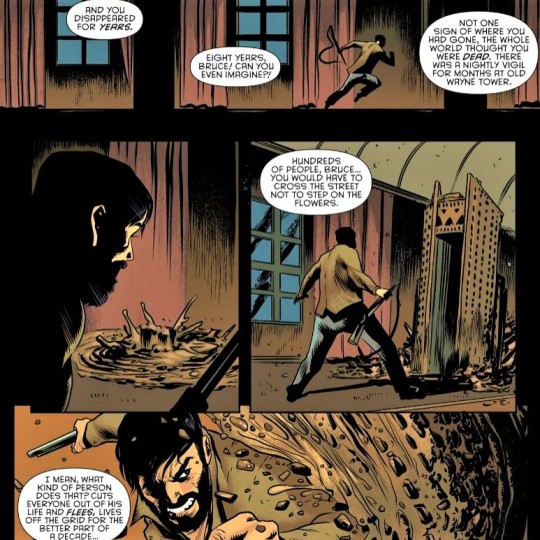
In Batman Annual #4 there is the BAREST indication that Edward might have started working at Wayne Enterprises early into Bruce’s sabbatical abroad, since he talked about how “for months” there were nightly vigils at Wayne Tower where there were so many flowers people would have to cross the street not to step on them. Presumably this would have only been in the first year of Bruce’s disappearance, when Bruce was 18; at the very least this indicates that Edward still lived in Gotham when Bruce left, though it would make more sense for him to be visiting Wayne Tower as Phillip’s strategist than as a hacker/carnie.
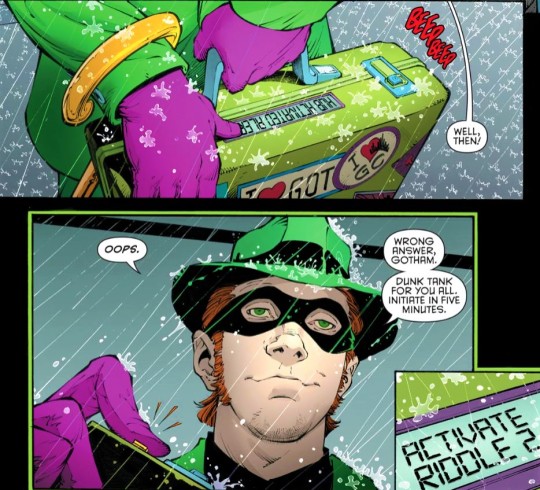
In general though, Edward’s Zero Year plan is so ridiculously complex that I think it’s reasonable to assume that he took as long to prepare for his debut as Riddler as it took Bruce to train to be Batman.
[Another side note: Not to accuse Edward of projecting or anything (God forbid), but I think it’s interesting that Edward puts so much emphasis on criticizing Bruce for “disappearing for years” and “making everyone think he’s dead” in combination with the COMPLETE absence of his father from his origin story as presented in Year of the Villain.]
I do think it’s fascinating that Edward’s New 52 origin veers away from the whole “cheating” thing that’s so central to his character in previous continuities - not that he DOESN’T cheat when he feels like it (the whole carnie thing), but it’s not presented as an insecurity of his, and here he’s genuinely intelligent enough to mastermind crimes without needing to move the goalposts at the last second (cough Arkhamverse Riddler COUGH).
One final thing from Edward’s adult life that I think could relate back to his origin comes from Batman #23.2, “Solitaire.”

The issue starts with a flashback of Edward having a deck of playing cards confiscated from him in Arkham because he was playing Solitaire (like, genuinely playing Solitaire; he actually wasn’t plotting anything, it was just for stress relief). The comic is his quest for violent revenge against the Arkham guard who took his cards, which initially seems like a pretty average example of Riddler Brand Pettiness, but the story goes out of its way to highlight how much this really bothered him.
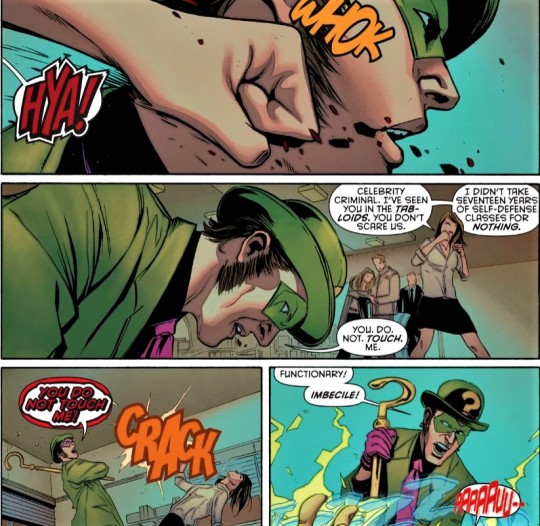

The Arkham Guard has moved on to become the head of security at Wayne Enterprises, so to get revenge Edward has to break into his old place of employment. An unexpected altercation with one of the executives leads Edward to totally freak out over her “touching” him, and afterwards he goes to meditate in her old office in order to calm down. His attempt to relax is interrupted by his old Arkham tormentor, who gets in a couple shots at him before Edward takes his revenge...


...which is BLOWING UP THE ARM that the guard used to take away the “small comfort” Edward had in Arkham. Afterwards, he goes up to the roof to play Solitaire, seeming to finally relax from his agitation earlier.
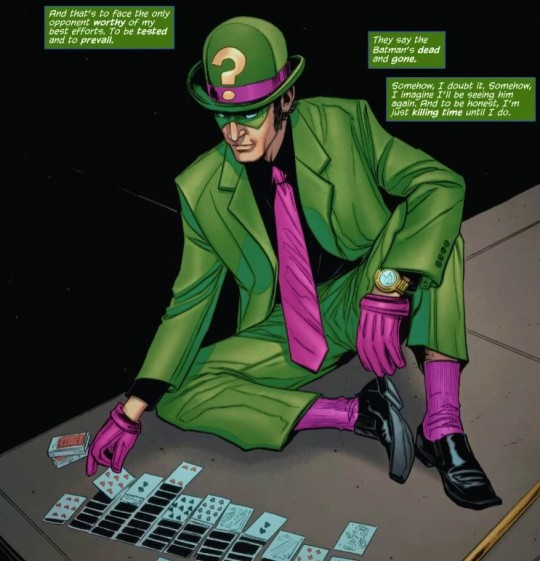
Given Edward’s isolation and neglect in childhood, it would make sense for him to have ended up playing Solitaire a lot: it’s a game that doesn’t require involvement from friends or family, but still requires a player to use strategy and skill despite the lack of an opponent.
[Yet another side note related to the previous side note: Batman is ACTUALLY dead during Solitaire, which takes place after Joker’s Endgame arc. Bruce and Joker are of course later resurrected through shenanigans, so Edward is right to think he’ll be seeing Batman again. But Riddler sitting on the Wayne Enterprises rooftop, indulging in a self-described “small comfort,” waiting for a man who’s disappeared to miraculously show up again is really interesting. Again, not to accuse him of projecting or anything, but... where’s your dad, Edward...]
His affection for Solitaire is also interesting, in the sense that one could argue that’s what he’s doing in Zero Year: playing a game with himself. He’s challenging other people to play with him through his “riddle” game, and he’s clearly prepared for the possibility of having an opponent (given that he has a whole rainbow disco death trap room set up at the end of Zero Year, which he seems DELIGHTED to have a chance to use), but he’s not expecting to have one. Whether this is a perspective rooted in his childhood or not, it seems to have changed after Zero Year, based on his riddle for Batman in “Alone.”
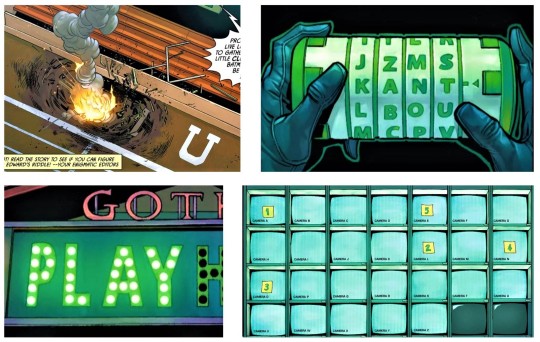
#riddler#edward nygma#zero year riddler#meta#if i missed something PLEASE let me know#i am by no means an expert on comics#i was considering titling this post 'here's how edward nygma can still have daddy issues in the new 52'#but ultimately i decided that was both not funny and not comprehensible#there are new bernie memes now#BUT i stand by it as a thesis statement
289 notes
·
View notes
Text
I Think The Van Speech is Seen A Bit Differently By Queer Audiences (Explanation)
(Or at least, possibly more layered)
Hi it’s Nate! Man who has too many feels about a two hour movie again, having yet more feels!
In some back and forth discussion with @bi-leigh-bi and @viridianpanther about the van speech and NIcky’s very much “oh fuck, homophobes” sigh, I am having some more EXPANSIVE thoughts. Also tagging @ink-phoenix
First I recommend demand reading Leigh’s Original Excellent Post, as it’s a complete precursor and the ground work for this.
I know we talk about the van speech over and over again, and yes, I’m about to do it, yet again. Because there really is just something so goddamned monumental about it. But I think, more importantly, it’s a close-to-home direct call back to something that queer people can, sadly, relate to.
The reason that the Van Speech gets the traction that it does is not only for Joe’s incredible eye-watering declaration, nor for how it spins the common toxic masculinity machismo narrative in action movies on it’s head, but also because how for the subject matter it doesn’t feel out of place.
I’d like to expand more one day on how in The Old Guard, the villains have been considered ‘boring’ in reviews. But I’d like to argue that it’s that said ‘boring’ that MAKES them so frightening. They’re the same every day nasty people we all know and live with. Which is infinitely more terrifying than something fantastical, if you ask me.
Keeping that in mind, considering that the movie takes place I think in 2019, and the characters in question are ‘standard humans vs men in the 950′s’ there’s a terrifying real world humanness to the guard.
Nicky wakes up to very quiet chaos. He wakes up to Joe pleading quietly at him for him to do that (wake up), and arguing with the Guard’s who keep trying to silence him. (Ain’t that a metaphor). Nicky fully comes to consciousness to:
“What is he, your boyfriend?”
And promptly reacts with the long-suffering dreaded sigh of a very old gay man who knows exactly what is to come. And he’s waking up at the disadvantage in that scenario too. He’s struggling to shake the knock-out gas out of his system, bound hand and foot and barely has his eyes open, and that’s the first non-Joe thing he really registers.
And for queer people, it’s not just the words. It’s the fact that, historically and even today, we can NEVER be sure what is going to follow those words.
For queer people, hearing that biting, mocking tone is a sign of a few things, some being (but not limited to)
1. Further aggression. (Violence? Is it violence this time?)
2. Nothing. (We tend to hope for nothing, but are not always so lucky)
3. We don’t know. (Is he going to gang up with his buddies now? Is this a situation that’s about to go from ‘mildly irritating’ to ‘really deadly’?)
For queer people, the sigh is the dread of mental preparation, even if nothing IS going to escalate we don’t know that. Even if it it just ends with scoffing and mocking, we never know when it’s about to get worse.
The sigh can be everything from exhausted annoyance, to quick-thinking mental preparation that puts your entire body on high-alert. Ready to fight whatever is about to come.
And here’s the other, very important element of that. A gay, interracial and interfaith couple of the last 920 year is more than aware of that. This is honestly one tick on the “Been Aggressed for Centuries’ bingo card they’re both familiar with. And Joe knows that as well as Nicky.
They are both quickly thinking the same thing here. They know they’re in danger (whether it’s minimal or possible) and being lead to the even more uncertain fate in Merrick’s lab. (Leigh’s original post, again excellent, explains why the van speech is for Nicky and not the guards, so I won’t go to deep into here). And Joe knows that Nicky is scared (Joe’s just as scared, but Joe’s got the benefit of full-consciousness here) and the added benefit of ‘protecting Nicky is second nature’.
With such fear and uncertainty at play, Joe IMMEDIATELY takes control of the situation.
“You’re a child.”
And that gets the guard’s attention (and interestingly, draws their attention away from Nicky for a moment) which Joe cues off on, and immediately has his eyes back on Nicky. Because now, with the instant threat away from Nicky, Joe can focus on him more clearly.
The entire rest of the speech is for him. For both of them. Joe is saying, in his speech, (without actually saying it), “I got you. We’ve done this before, we’ll do it again. You’re safe-I’m safe, these people are a blip on the radar, right babe? No matter what, we’ve faced worse people than them. We can do this, we’re used to this shit.”
Doesn’t make it EASIER mind, but it’s a good reminder. We are still in control. We will fight back. They are not separating us. Goons will not take you from me, okay?
And I like to think that by reassuring Nicky, that by watching Nicky’s face, by seeing him react, and absorbing him, Joe reassures himself too. Interestingly! I think Nicky nicely returns that reassurance. He has one line, but it’s more than enough.
“You incurable romantic”
You got me. I got you. I’m with you. We’re on the same page, we always have been, always were.
The kiss is also for them and them alone. Because if they never see each other again, if they never have the ability to be together again, then at least there’s one last time.
There’s the element of hope there too-and yeah, they do kill the guards and all, but that doesn’t really put the ball in their court. They still don’t know what’s coming after.
History is messy. History is up and down. There will have been periods of time in said history where Joe and Nicky had an easier time of things. More acceptable, more open-and periods of time where things were really fucking bad for them. And they can never really know which period or scenario that’s going to be. They’re always going to have one small element of ‘alertness’ in the back of their heads about it. Because they have to. As a couple they have so many elements of ‘this is what society hates’ working against them.
And in other movies, that might be the ‘this is where we make it very sad and angst-ridden’ but in The Old Guard, they survive. Every time.
And man if that doesn’t feel so good to see.
To some, the van scene might seem fantastical and out of place. Like Joe just suddenly has some big romantic declaration out of nowhere. But for queer audiences, for any audience that is used to living an existence where this is a regular scenario (homophobia, not being kidnapped) it’s very non-fantastical and very much not out of place.
Because it’s a reality we know in some way.
It’s brilliant. It’s intense, it’s raw. It’s one of the scenes I still can’t watch without a little bit of crying, and there’s SO much to a scene that lasts 1 minute and 24 seconds and it’s one of the most amazing things I’ve ever seen in a film.
It’s written incredibly. It’s acted phenomenology and directed so well. And make no mistake, to queers, it reads with more layers than one might even see on a first viewing.
#the old guard#kaysanova#the old guard meta#meta#my thoughts#old guard meta#yes another van scene meta post#bi-leigh-bi#viridianpanther#ink-phoenix#the van speech
539 notes
·
View notes
Text
Thoughts after rewatching Episode 4
Okay, so I took a couple of days to get over the excruciating cringeworthyness of a few many moments in episode 4 and have just finished rewatching it.
And I have to say thank goodness for whatever it is in the human brain that allows us to adapt! lol No, but srsly, I found it a much easier watch the second time, and its definitely keeping up the trend of the first three episodes of being something I can enjoy more the second time than the first.
So, my now somewhat less instant reaction thoughts:
I hadn’t noticed that it’s Sylvie that initiates the hand holding on Lamentis 1. And I think I prefer this. One thing I can’t stand is romance in TV or film where it’s all about the guy winning over the girl, like she’s clearly not interested, but somehow by the end of the movie she’s in love. Okay, that’s a bit harsh, sometimes it’s done well, but it’s a convention that gets my hackles up and gets me all defensive, so I think I was taking some of this into the episode with me.

Interestingly, now that I’m thinking of it, I think this moment and the moment Sylvie asks if Loki is okay while they’re being escorted by the guards are the only moments I can recall where she showed any form of affection for him. *shrugs*
Poor boy also seems so surprised at this. And uncertain how to respond. And I can’t help but see this in relation to the scene in Thor 1 where the frost giant grabs his forearm... :’(
I also think another part of the reason I so disliked the romance on my first watch is that it was just another example of Loki over-doing the emotion thing in comparison to his previous characterisation. He certainly looks more into it than Sylvie, and this just bugs me, because again I think the way Sylvie is acting here is what I would have expected from Loki based on the films.
In the time prison, while I still don’t like the getting kicked in the crotch gimmick, I do like that they showed us Loki attempting to get out of the situation in what seems quite a reasonable way. He explains the situation to Sif and asks for her help to escape. I thought it was quite interesting, because we see his first instinct is to use his skills of persuasion and try to escape. Firstly because it’s an instance where he’s trying to plot an escape, not just avoiding her or fighting her. I like that he seems to have some hope that this is possible and isn’t just 100% resigned to the TVA being all-powerful. And secondly, he speaks to Sif as a person, he doesn’t just treat her like some sort of solid hologram and try and knock her out, or stand by the door to make a surprise attack. It doesn’t work, of course, and we’re supposed to find that funny, but at least he tried in a plausible way onscreen. unlike IW And he asks her to trust him. Which I found interesting because if he’s asking this then he must think there’s some chance that she will, which means there’s at least some level of respect between them. And I like that. I know I’m reading way too much into this that the writers certainly didn’t intend, but let me play over here.
I still don’t like the narcissist line. But I think I can buy Loki exaggerating in his confession to get her to stop. He doesn’t seem to be really particularly bothered by what he’s saying. But when she walks out and says he will always be alone, even after what he’s just said, that seems to have an impact on him.
I do love this image though. He looks so smol. So sweet.
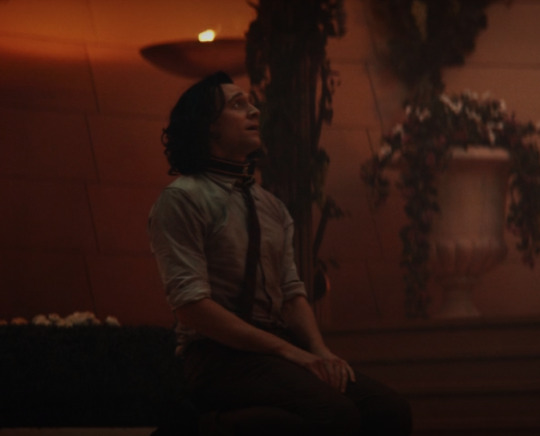
When Mobius retrieves Loki from the time prison after the first time, I can see after a second watch that Mobius is actually a little angry/disappointed that Loki ran off after the variant in Roxxcart. Its subtle well subtler than Loki’s reactions so I hadn’t noticed.
I still dislike the way they did the romance thing. The interrogation scene where Loki’s all “eww no, I don’t like her!” and then has this realisation that perhaps he does. I felt like I was being beaten around the head with it. Like teenagers teasing someone for liking someone else. smh
I’m also reminded that the English language really isn’t very good when it comes to words for ‘liking’ someone. I mean the UK seems to have ‘to fancy’ which would be more accurate, but gotta say I’m glad they didn’t use that here.
I still hate that Loki seems utterly unable to keep a secret or hide his emotions. To me this was a fundamental part of his character, and yet here we have Mobius calling him out because he can’t help but have this pained expression on his face and can’t keep his voice steady. Black Widow wouldn’t have had to spend more than a minute with this variant of Loki.
Mobius: “What are you doing?”
Loki: “Passing the time.”
This line made me laugh this time. Sassy Loki!
I still like the slightly veiled way Mobius apologises to Loki for saying he’s only destined to be the villain to make other people better. Nice, not too over the top. Makes Loki smile.
That animatronic timekeeper stuff was just weird. There better be some good payoff for this in the next two episodes.
And now to the bit I hated the most on my first watch – that super cringey interrupted confession of feelings.
Looking at this again with fresh eyes I wonder if Loki was about to explain Mobius’s theory that their moment on Lamentis 1 might be able to destroy the TVA. It just got awkward because to explain that he’d have to explain how he feels. And I think they exaggerated that to make the impact of the pruning bigger.
First he says “then who created the TVA?” Then he turns away and he seems to be looking around for inspiration, and I think he’s actually thinking about this. It wasn’t just rhetorical. We can see the moment he realises something, and he doesn’t seem particularly happy about it, and then he turns back to Sylvie.
“Sylvie, I have to tell you something.”
“We will figure this out.” I think this is an aside after he’s taken in how upset she is about this. And it’s true that if they take down the TVA then they probably have to learn who’s in charge eventually. And then he gets back to his original point.
“Because… er… back on Lamentis…” I think here he’s trying to find a way to explain that their moment caused the nexus event, and a big one at that, but he’s struggling to do so in a way that doesn’t make him completely vulnerable by telling her how he feels. But it’s not possible to talk about it so clinically, so he hesitates, “This is new for me…” he realises he doesn’t actually know quite how to put this.
Now, if I can rationalise it in this way as being an important piece of information he needed to tell her that would help them bring down the TVA then I can be more okay with this than if it was just a poorly timed romantic confession (which is certainly what it appeared to be on first watch). Again, I’m probably clutching at straws here, but it helps me not want to gag while watching this. lol
I mean I still think it’s just a cringey awful scene and it’s so very cliche to interrupt someone before they can say ‘I love you’. But this is a way I can rationalise his actions and I’ll stick with this till proven otherwise, presumably in the next episode. Ha!
I can’t help but give a nod to another beautiful example of Tom’s eyes matching his shirt in the mid-credits scene. <3

I also think that what I’m experiencing watching each episode the first time is much more from Loki’s point of view. Like I’m more personally invested in him doing well, him not being embarrassed, him looking good to others. And so since the story is actually giving him a hell of a time I’m experiencing a lot of negative feelings on his behalf. And this is because it’s unfolding in real time in front of me and in that moment it could go anywhere! So it feels more real perhaps?? On a second watch I know what’s coming and I’m able to watch it with an eye for the storytelling as a whole, not just as the real events of Loki’s life. I don’t think I’ve been this much of a fan of any character in recent times to have experienced this before. So it’s a fascinating thing to learn about being a fan. *shrugs*
Anyway, in summary, much more bearable on second watch. Some good stuff in there, and I can ignore a good amount of the stuff I didn’t like – at least until next week.
So again I’m sorta somewhere in between loving and hating this show.
@iamanartichoke @scintillatingshortgirl19 maybe some of this is useful to you?
43 notes
·
View notes
Text
Playing Genshin for a couple of weeks now and I have some thoughts about Mondstadt, its seeming prosperity, and criminal elements!!
Also dunking on Diluc a little bit lol.
I'm not even going to touch hilichurls, they're probably the one issue I expect the game to come back to in time! They seem to be an intelligent race that was cursed and so we might get some sad backstory and realize that we've been assholes to them, not 100% sure but hopefully.
Other than hilichurls and the Fatui (and yeahhh so fun to make russians into villains, im guessing it's for attracting the american audience or something... at least the characters are interesting enough), there are also Treasure Hoarders, who in the archive are mainly described as workers who lost their jobs or some other manner of poor people who turned to looting and crime out of desperation. And yet the angle is that 'thieving is always morally wrong'.
Somebody didn't read Les Mis, I guess!
Another note, there seems to be a weird gameplay and story segregation where we as the Traveler do lots of looting and treasure hunting ourselves only to be commended for it. But I digress.
My actual point is that interestingly enough those elements of worldbuilding come together pretty well when you look at the city itself!
In Mondstadt it is most difficult to become a small business owner, made all the more obvious when compared to Liyue's wealth of shops, services, and traveling traders (Liyue has its own baggage of problems which tbh seem more serious to me but that's another topic). It's just not the most profitable occupation! Almost everyone we see out on the streets does their own resource supply, production, and service.
Naturally, this means that those people don't earn enough to hire their own workers. In turn, that means that there are no jobs to be found in those places.
So, where are all the jobs? For that we have the Dawn Winery, the Knights of Favonius, and the option to leave for Springvale to become a hunter or go to a different country altogether.
The winery is described as the city's most powerful industry both for local consumption and export, but how does it actually treat its workers?
Well, for example there's Patton who accidentally broke a bottle of expensive wine and is now basically an indentured servant to Diluc. He says that even if he worked without any breaks he still would need 48 years to pay off his debt.
We can meet his daughter near Venti's statue who has to play by herself because her father is always working.
Does that really seem like freedom to you?
There's also Guy's father who works at the winery itself and can't afford to rest even when he is heavily sick and old. These are the worst examples for sure but others also have their own smaller problems like Charles who confides in us that he often feels tired and only takes nights off when Diluc is in a mood to tend the bar himself etc.
It is kind of telling that we don't have the option of engaging with their problems and we can't really talk to Diluc about it either. For all that he defends the city each night, he shows no interest in defending his own workers from his business's predatory tactics. To say nothing of the great damage he does to the adult populace of the city, always supplying alcohol and tempting people with deals and sales when there are already too many drunkards even among the named characters. When the opposing tavern (which also only has Diona for a bartender even when her own father has alcohol dependence) chose to present a non-alcoholic beverage during the holiday Angel’s Share doubled down on alcohol. And it doesn't even have snacks? This one bit was probably just for joke purposes, but tbh it's pretty dangerous to drink without any snacks at all, it makes sense why people get so heavily drunk in the first place. Note that Diluc himself doesn’t drink, showing good judgment when it comes to himself. Meanwhile the only person Diluc seemingly has no problem cutting off is Kaeya and it’s not obvious whether that’s out of concern or pettiness. Nobody is cutting off Nimrod who is ruined by his addiction! Now this is probably the core reason why Nimrod turned to crime, and I wouldn’t be surprised to learn that he and his wife are dependant on Kaeya who at the very least knows to appreciate his informants. Kaeya himself is also a gleeful enabler, by the way, which makes sense considering his uh.. everything. And his upbringing at the Dawn Winery didn’t hurt, no surprise why he’s so keen on wine himself. He might be shrewd and oh so clever when it comes to getting information in taverns, but his story details and voice lines confirm that there actually is a problem even if we don’t know the full scope of it.
Now, the Knights of Favonius? Aside from being corrupt in the past they happen to hire minors (we can read that in their handbook) whom they don't even pay. What's that, free labor for the simplest of tasks? Makes sense why some of the adult knights laze about if all the work gets done by minors or the more focused and accomplished senior knights with Visions. That's a wonky structure for sure. Guy tells us that he became a squire at 16 and still has the boring job of guarding the back gates despite repeatedly showing signs of great dissatisfaction. I wouldn't be surprised if he betrays us later or something, honestly. Maybe Kaeya is preparing him for double agent work, who knows. Right now he has no opportunities for climbing the career ladder to take better care of his sick father, stuck in a pointless job for months.
And that's a talented and focused young man! what about regular folk?
Well. In the end, regular people have several options.
They can give up and overwork themselves while spending nights looking for coins in the wishing fountain to try and scrape enough for their sister’s medicine.
They can go to the Adventurers' Guild which has highly dangerous commissions with the most profitable ones taken on by Fischl and other professionals, hardly a dependant job for a regular person.
There’s also Church which we know very little about. Likely it's dependant on taxes and donations and it’s the one organization that cares about the orphans of the city (no, keeping Klee in solitary doesn’t count as caring, Knights of Favonius!).
There’s Springvale for hunters, farmers and chefs, a difficult lifestyle to maintain when the hunting grounds are in one of the Four Winds’ domains with strangely intelligent wolves.
And then there’s the other more accessible and obvious option!
You guessed it, it’s crime!!
And there it is, the reason why there's such a big problem with bandits and overworked people in Mondstadt :)
Honestly after writing all that down, if I were to RP a normal person in Mondstadt I’d try to get into the Treasure Hoarders guild at like 5 years old I think. Better than standing around watching random people kill my pigeons anyway.
Tbh this is less of a 'makes you think huh!!' take and more of a commendation towards the writers of the game. They obviously have a more conservative outlook if they're so keen on condemning the thieves who have to steal in order to survive, but the world itself makes a lot of sense.
It makes the game a lot of fun to explore.
#genshin#genshin impact#mondstadt#diluc#dawn winery#knights of favonius#text#this is getting 0 attention i know but still#wanted to type this up haha
87 notes
·
View notes